| Ellesdon & Henvill Families - Lords of the Manor of Charmouth from 1648 until 1783. |
|
||||||||||||||||||
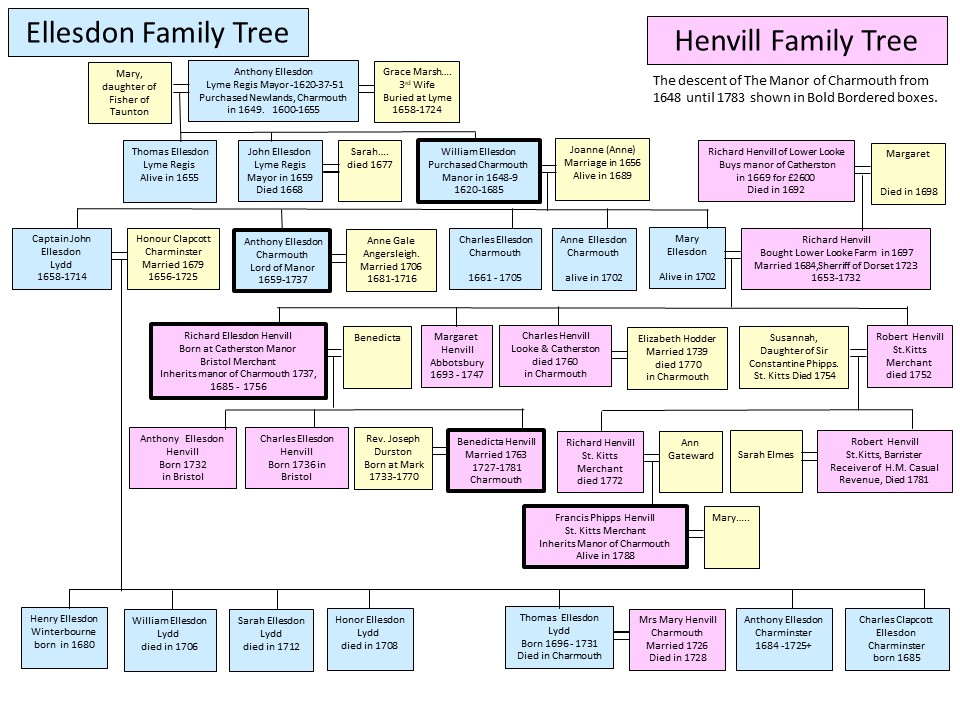 |
|||||||||||||||||||
I have been fascinated by the gentleman who planned and nearly succeeded in the attempt to assist King CharlesII in his Escape to France. His name was William Ellesdon and both he and his descendants were to dominate the lives of villagers for nearly 150 years. I have tried to build up a picture of Charmouth during this turbulent chapter in the country's history from the limited records that have survived. The year before the Civil war began in 1641, Parliament decreed that all males over 18 should take a Protestation ( declaration of loyalty) Oath . All names were listed and anyone who refused to take it was recorded. Seventy five gentleman were to sign it in Charmouth, which has shown to equate to an approximate total population of 250. In the same year there was an order that the hundred of Whitchurch and the tithings of Hawkchurch and Dalwood were ordered to contribute £ 10 per year to the Poor Rates of Charmouth -"where there are many poor people whom the parish cannot relieve". A further insight into the state of the village can be seen in the comprehensive survey carried out by Sir William Petre when he purchased it from the Queen a century before . The original document survives in Devon Record Office and clearly shows that the majority of his tenants occupied cottages along the Street with an acre of land and a further acre of common land which they farmed.There were a number of people who had larger holdings, the most prominent of whom were the Limbrys. A branch of this family lived in what is today' s Charmouth House, but then known as The Fountain. It was one of a number of hostelries along the Street that served travellers using the London to Exeter road that passed through the village. A descendant of this family, Stephen Limbry was to feature as the seaman in the attempted escape of King Charles II. A contemporary road map by John Ogilby shows the village with its main Street lined with houses and the paths to the sea, now Lower Sea Lane and Barr ' s Lane which led to Wootton Fitzpaine. At the beginning of the Civil War the village was mainly owned by Sir John Pole. He had sided with Parliament and in 1643 he twice helped to lead anti-royalist raids in Devon and Cornwall. However, he also participated in abortive local peace negotiations that year . His position in Devon was complicated by his son William ' s decision to fight for the king, and both Colcombe Castle and Shute Barton were badly damaged during the war, by royalist and parliamentarian forces respectively. He was active in local government but he evidently disapproved of Charles I ' s execution as he declined to serve under the Commonwealth, despite being retained on the Devon bench. He died in April 1658, and was buried at Colyton, where he had erected a lavish monument to himself and his first wife. Although he was to sell the Manor of Charmouth to William Ellesdon in 1648, he retained The Mill and 35 acres of land in the village, which was eventually to be sold by his descendants at the the end of the 18th. Century. William Ellesdon in contrast to Sir John Pole was a staunch Royalist. No doubt his father,Anthony held the same sympathies and in buying the adjoining Newlands with its fine house, Stonebarrow Manor, the following year was making a hasty departure from Lyme Regis,where he had been Mayor no less than three times. This town had always held an independent stance and was known as a Parliamentarian strong hold. This culminated in the famous Siege of 1644,when for 8 weeks they withstood the forces of Prince Maurice, who eventually abandoned his attempt.Loyalties to each side existed within families and it is interesting to see who William's brother, John supported, for there is a later letter from Col. Robert Mohun "setting forth articles against John Ellesden, who was put into the place of Collector of Customs of Lyme by Cromwell". The Ellesdons were originally successful merchants from Lyme Regis and were regularly Mayors of the borough. The Church still has a brass shield which extols them and records 4 generation being buried in their vault. Coincidentally the last is Anthony, father of William Ellesdon the central character to this article who is shown as dying in 1655. This same gentleman purchased the Manor of Newlands, which today forms part of Charmouth in 1649. The family lived in a large house in Church Street,near where the famous George Inn stood. It was here that William and his brother John were to be bought up by their parents Grace and Anthony. Johns life was to be spent in Lyme Regis where he was to eventually become it's Mayor in 1659 and with his wife Sarah Clapcott have four children,John,Grace,Mary, Thomas. The latter was to briefly unite the two branches of the family by marrying his cousin Mary in 1726, who by then was a widow on the death of her husband, Richard Henvill. William Ellesdon was a Royalist and held the position of Captain and later Colonel in the army and was to risk his life in support of the King. For that would have been his fate if charged for assisting in his escape. It must have been a miracle that he was able to remain a free man until his return.He had been earlier successful in assisting Lord Berkley escape across to France after the Battle of Worcester and no doubt would have repeated this with Charles, if Stephen Limbry had not returned home to his angry wife. But King Charles was to give him a gold coin when he briefly spent the night before the planned escape at a house his father owned at Monkton Wyld, still called Elsdons. At the same time he promised that when he regained his throne he would reward him handsomely.His Majesty, on his restoration visited the village and granted to him and two successive heirs a pension of £ 300 per annum, and presented him with a medal bearing the inscription "Faithful to the Horns of the Altar". The King also gives a beautiful miniature by Samuel Cooper of Ellesdon , together with a pair of silver candlesticks. He was also presented with a coat of arms, which can be seen today on their marble memorial in St. Andrews and on a large plaque commemorating his son's later improvements to the church. The pension was for both him and his immediate family and would be derived from taxes received from the port of Lyme Regis. There is a website called british history online that has a huge database covering parliamentary records and almost yearly there are references to those benefitting from his pension and through this I have been able to obtain important information about the family. Most intriguing was £ 1000 he was to receive in 1663 for his work for the King's Secret Service. Unfortunately the money was often not forthcoming and there are pleas from his family for these outstanding payments. It shows that he died in 1685, the year of the Monmouth Rebellion, but his pension was to continue to be received by his wife, Joanne and children - Anthony, Charles, Mary and Anne. It was his eldest son Anthony who was to take over his role and live in what was the largest house in the village opposite the Church, where he lived for almost 80 years. Little is known about him apart from the charitable work that he did that is recorded on the impressive marble monument erected by his niece's husband, Richard Henvill who inherited his estate. He no doubt had the same loyalty as his father to King Charles II, as he was still receiving a pension of £ 100 a year as a result of his support. |
|||||||||||||||||||
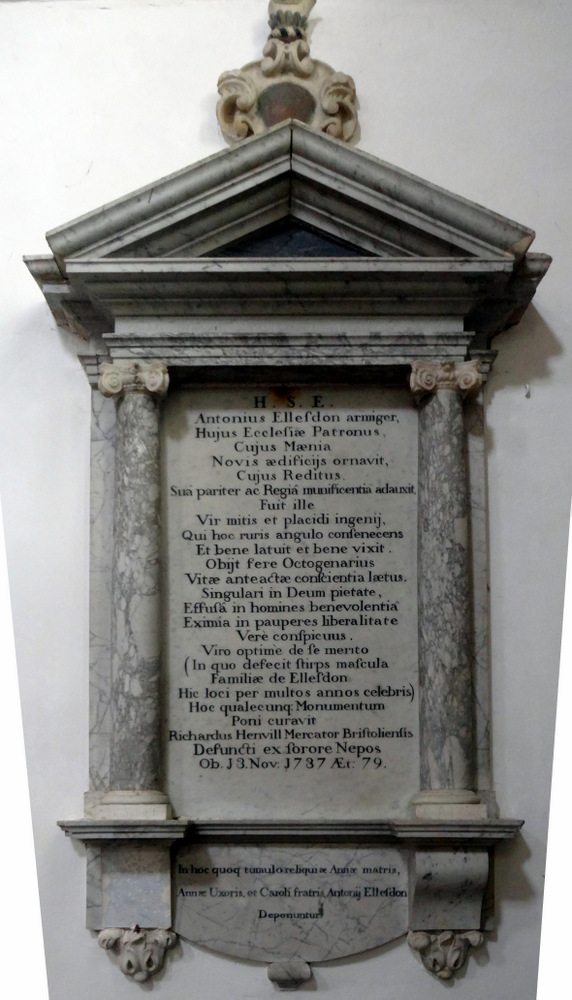 |
|||||||||||||||||||
| H S.E./ANTONIUS ELLESDON armiger/hujus ecclesiae partronus,/cujus moenia/novis aedificiis ornavit,/cujuc redditus/sua pariter ac Regia munificentia adauxit./Fuit ille/vir mitis et placidi ingenii/qui hoc ruris angulo consenescens/et bene latuit,et bene vixit:/obiit fere octogenarius/vitae ante actae conscientiae/laetus,/singulari in Deum pietate/effusa in homines benevolentia/eximia in pauperes liberalitate/vere conspicuus./Viro optime de se merito/(in quo defecit stirps mascula/familiae de ELLESDON/hic loci per multos annos celebris)/hoc qualecunque monumentum/poni curavit/RICHARDUS HENVTLL mercator Bristoliensis,/defuncti ex sorore nepos./Ob. 13 Nov. 1737,aet.79V In hoc quoq: tumulo reliquiae ANNE, matris/ANNAE uxoris et CAROLI fratris ANTONII ELLESDON,/deponuntur. to Anthony Ellesdon, 1737, and later inscriptions to Ann his mother, Ann his wife and Charles his brother, wall-monument of white and veined marbles with flanking three-quarter Ionic columns and pedimented entablature, by M. Sidnell of Bristol, the cartouche above is probably from a late 17th-century monument; on S. wall, |
|||||||||||||||||||
Anthony Ellesdon Esquire Richard Henvill, Merchant of Bristol, nephew by |
|||||||||||||||||||
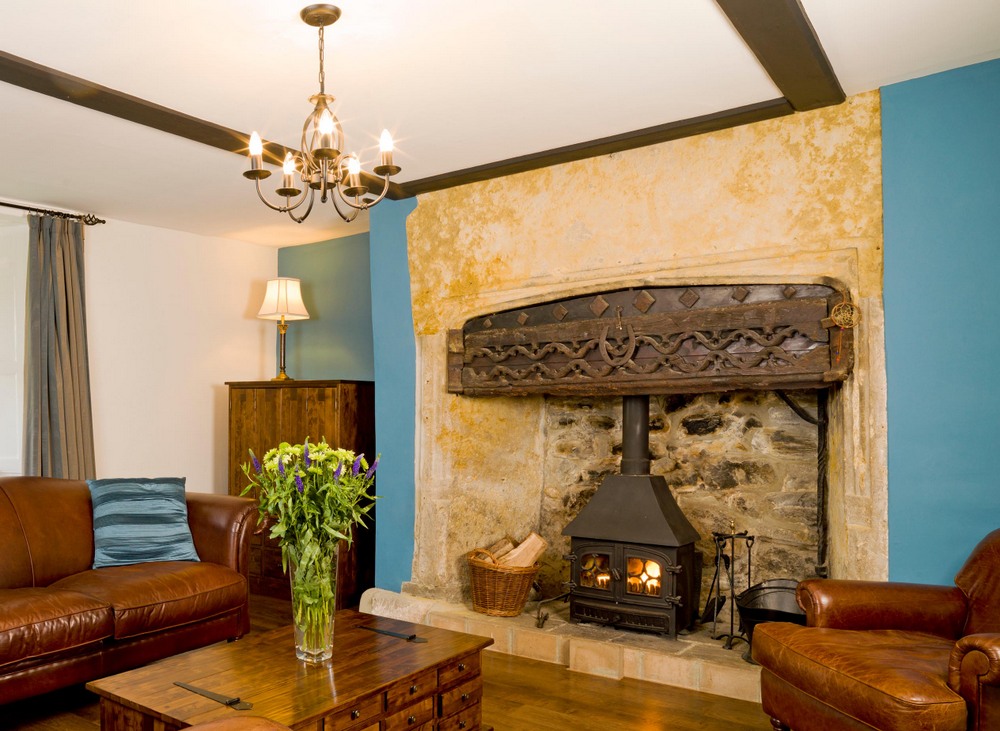 |
|||||||||||||||||||
|
|||||||||||||||||||
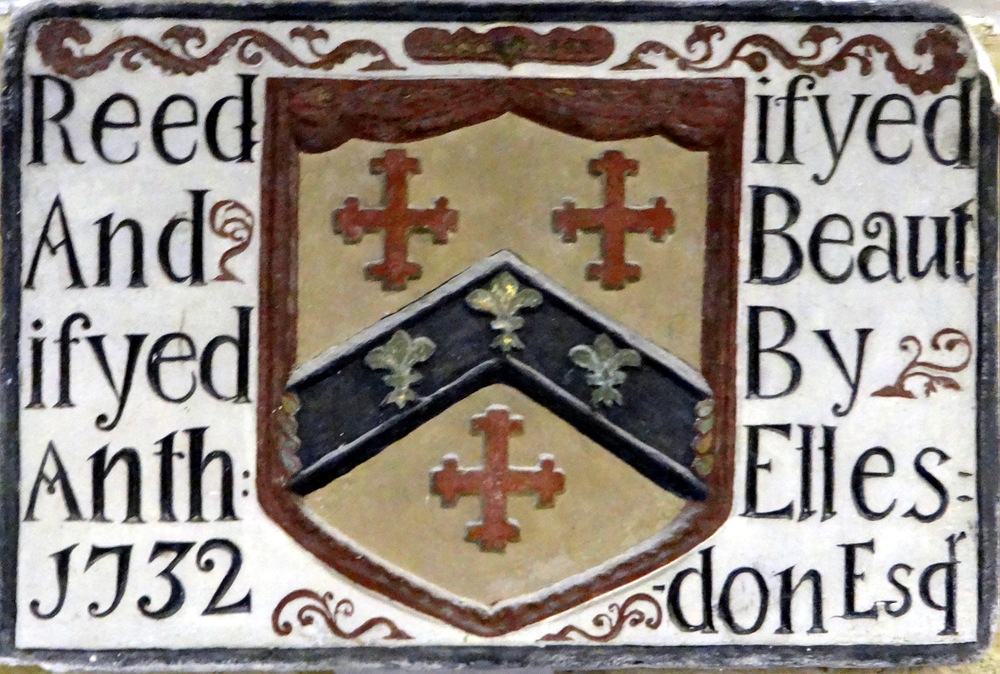 Above the door leading from the Annex to the Tower area is a painted board bearing the Coat of Arms of the ELLESDON family. Left-hand side of the shield "Reed/Ano/ifyed/Anth:/1732". Right-hand side "ifyed/Beaut/By/Elles/don Esq." family. Above the door leading from the Annex to the Tower area is a painted board bearing the Coat of Arms of the ELLESDON family. Left-hand side of the shield "Reed/Ano/ifyed/Anth:/1732". Right-hand side "ifyed/Beaut/By/Elles/don Esq." family. |
|||||||||||||||||||
 |
|||||||||||||||||||
 |
|||||||||||||||||||
| Members of the EUesdon family were Mayors of Lyme Regis seven times between 1521 and 1651, in which year Anthony Ellesdon held the office. In the ancient and interesting church of Lyme Regis is a brass in memory of four of them with the family arms and the lines : — "Men pious just & wise, each many a yeere The helme of this towne's government did steere Beyond base envious reach, whose endless name Lives in all those that emulate theire fame." William Ellesdon, who subsequently furnished Lord Clarendon with the detailed account of his share in the events of September 22-3, 1651, had two sons, Anthony and Charles (the latter, born on June, 1661, named after the King). Anthony Ellesdon lived till 13 November, 1737, having survived his brother Charles thirty-two years. There is a monument to him in the new church at Charmouth, removed thither from the older building. His mother and wife as well as his brother Charles were buried in the same vault with Anthony. | |||||||||||||||||||
1718 date on Plate |
|||||||||||||||||||
 |
|||||||||||||||||||
| On the right of this slide is the magnificent marble memorial erected to Anthony Ellesdon by his nephew.When he died in 1737 he gave a substantial proportion of his wealth to his two nephews, Richard Ellesdon Henvill and Charles Henvill. It seems Charles was to stay in Charmouth and married Elizabeth Hodder and both were later buried here. He would have lived at the manor house whilst his brother Richard was a merchant living in Bristol,who was very active in the Tobacco and Slave Trade. Robert Burridge who bought the Fountain, now known as Charmouth House, was also involved in this trade and his account books for the many trips he undertook are to be seen in the Dorset Record Office today. Richard is only Lord of the Manor for seven years and it is his 17-year-old daughter, Benedicta, who is to inherit the village. Later in 1760 she is left Catherston on the death of her uncle Charles Henville.She marries the Rev. Joseph Durston at the age of 36 , but they are to have no children and she is widowed by 1770. She is no doubt living in the village either at Charmouth or Catherstone Manor as her signature appears on many documents of the time. |
|||||||||||||||||||
| The Manor House today opposite the Church has had considerable alteration over the years but would have been the home of William Ellesden who had at least 4 children. The Hearth Tax for 1661 shows his ownership with 6 chimneys and the next largest would have been the Fountain,now Charmouth House then owned by William Limbry with 4 chimneys. Anthony , the eldest son of William inherited the manor of Charmouth and was to live for 83 years in the village.He was to outlive his children and his fortune was to go to his sister, Mary's family - the Henvills, who had originated in Lower Looke, near Abbotsbury. In the year ,1669 they had bought Catherston for £13,000 and would have been neighbours of the Ellesdons. |
|||||||||||||||||||
iii) Anthony Ellesdon (1654-1737) Most of Anthony's life was to be spent in Charmouth and he is often referred to in Deeds and documents of the time. He would have no doubt lived in the Manor House, which would have been more imposing than what we see today after being subdivided and altered in the 19th century. In 1716 he married Anne Gale from Angersleigh, near Taunton in Somerset. Sadly he outlived all his family and his fortune and Estates were to be left to his sister's sons Richard and Charles. The Church in Charmouth has a painted board with the coat of arms of the family dated 1732 and a Silver Plate presented by Anthony in 1716. A document in the vestry dated 9th April 1714 is an Indenture between Anthony Ellesdon and Thomas Thorne of Hawkchurch, yeoman. "For the sum of £90 pd by Thorne hath demised all that tenement called Wade's Tenement in Mill Lane (Lower Sea Lane) and one piece of ground called Woollmington`s Close, lying in Lyme Lane, one orchard belonging and Davy` s Tenement, on a lease of 99 years, if Joane Thorne his wife and Joane and Mary his two daughters so long happen to live, paying rent yearly of six shillings, two fatt pulletts or eighteen pence of lawful money on 25th Pec each year Thomas Thome during the 99 years lease shall not fell any oak y ash or elm tree now growing or hereafter growing" signed by Anthony Ellesdon. His nephew was to commission an elaborate marble monument to his uncle, which was transferred when the present church was built in 1836. He was patron of the church and paid for extensive improvements to it in 1732. From the long description of his acts of charity he would seemed to have been well liked. His Will shows him owning property in the parishes of Symondsbury, Lytton Cheney, Winterbourne Stapleton and Winterbourne Abbis in Dorset. It also refers to his father in that “I give to Richard Henvill the use of my medal set round with diamonds which was given by his late royal majesty King Charles II to my honoured father for his loyalty to the said king.” |
|||||||||||||||||||
| Patrons of Catherston, the neighbouring village, showing Henvills as Patrons of both villages. | |||||||||||||||||||
| Romeo Hamilton, an African was baptised 28th September 1800 | |||||||||||||||||||
| William Ellesdon Persecution of Dissenters in Charles II reign William Ellesdon esq. of Charmouyh stands charged with discouraging in formations against non conformists - giving one third of a fine received upon the conviction of John Brice. The nin conformists minister of. Charmouth to that very individual, and for not preventing field convertibles when informed where they were Holden. State papers office.m |
|||||||||||||||||||
Members of the Ellesdon family were Mayors of Lyme Regis seven times between 1521 and 1651, in which year Anthony Ellesdon held the office. In the ancient and interesting church of Lyme Regis is a brass in memory of four of them with the family arms and the lines : — " Men pious just & wise, each many a yeere The helme of this towne's government did steere Beyond base envious reach, whose endless name Lives in all those that emulate theire fame." Whilst it was long and often consulted concerning his Majesties transportation, a certain Merchant (whose name was Elsden) came into the mind of Mr. Windham, formerly a Captain under his Royal Father, who since that time had used the gainful Trade of a Merchant, in the Town of Lime, in whose power it was peradventure to provide a Ship, because he remembred that this Merchant procured a Transportation for the Lord Barkley, when he was in great distress. Therefore Mr. Windham is sent unto him, to enquire, whether he was able safely to transport the Lord Wilmot, and another Nohle-man, who had lately escap'd at Wor- cester Fight. He willingly consents unto it, and goes presently to Charmouth, a place bordering nigh Lime ; where applying himself to a But afterwards it appears, that the Ship-Master returning home to his House, that so he might furnish himself with Linneni and other Necessaries, for the Voyage^ his Wife keeps him, by locking the Doors upon him. For upon the Fair day, there was Proclamation made in the Town, by which it was declared, 'That no man living, on fain of death, was to assist the King, or to conceal him ; and a thousaiid founds is to be given to a7iy man that shall discover him. By reason of which, this poor Woman is so affrighted, that she fears her Husband, |
|||||||||||||||||||
The Ellesdens (1648-1737) At last Charmouth had as Lords of the Manor a family who were to reside in the Village. There are many references in the parish records to them and more significant is the beautiful Marble Memorial in the Church to Anthony Ellesdon. They would have lived in the Manor House in the Street, opposite the Church. The Ellesdons had been successful merchants in Lyme since the 15th century and had been Mayors of the town on frequent occasions. They lived in a mansion near the Church and there are records of “Ellesdons Lands” in the Manor rentals. Hutchins in his History of Dorset provides a family tree from Ralph, who was Mayor of the borough in 1521 (i) Anthony Ellesdon (died 1655) In 1649 Anthony was to purchase Newlands Farm, which had formerly been part of Charmouth Manor from descendants of the Wadhams. Stonebarrow Manor may well have been a home to the Ellesdens in due course. (ii) William Ellesdon Perhaps Charmouth`s most famous son thanks to his role in one of the most exiting episodes in British History. For on 22nd September 1651 Charles II was to spend just one night in Charmouth, but its repercussions were to be momentous. If all had gone to plan he would have escaped with his life to St. Malo in France and Exile. Instead it was to be from Brighton twenty-four days later that he finally escaped. William Ellesdon was chosen by Colonel Wyndham to assist, but unfortunately the wife of Stephen Limbry, who was to ferry the King across to the boat found out and it had to be abandoned. Charles thought highly of Captain Ellesdon and later presented him with gold chain and medal bearing the inscription “Faithful to the horns of Altar” and a pension of £300 per annum. We are fortunate that William gave a very descriptive account of his involvement with the Kings escape which was later published in Clarendons “History of the Rebellion and Civil Wars in England”. It was William Ellesdon who in 1648 was to buy the Manor of Charmouth from Sir John Pole. He was both a barrister at law, and a captain in the King's forces. The Hearth Tax shows him living at the Manor, with 6 hearths, by far the biggest house in the village. The will of Honora, the wife of William is full of information about the family who seem to have property both in Dorset and around Lydd in Kent. She leaves her wealth to her eldest son Thomas and his brother Anthony in 1725. Again the Will of Thomas Ellesdon has survived with a detailed Inventory of his possessions and properties. He spends his last days at his brother Anthony's Manor House in the year 1730. He has considerable wealth, which includes gold and silver jewellery that is shown by its weight. This and his mother's inheritance were to all go Anthony. (iii) Anthony Ellesdon (1654-1737) Most of Anthony's life was to be spent in Charmouth and he is often referred to in Deeds and documents of the time. He would have no doubt lived in the Manor House, which would have been more imposing than what we see today after being subdivided and altered in the 19th century. In 1716 he married Anne Gale from Angersleigh, near Taunton in Somerset. Sadly he outlived all his family and his fortune and Estates were to be left to his sister's sons Richard and Charles. The Church in Charmouth has a painted board with the coat of arms of the family dated 1732 and a Silver Plate presented by Anthony in 1716. A document in the vestry dated 9th April 1714 is an Indenture between Anthony Ellesdon and Thomas Thorne of Hawkchurch, yeoman. "For the sum of £90 pd by Thorne hath demised all that tenement called Wade's Tenement in Mill Lane (Lower Sea Lane) and one piece of ground called Woollmington`s Close, lying in Lyme Lane, one orchard belonging and Davy` s Tenement, on a lease of 99 years, if Joane Thorne his wife and Joane and Mary his two daughters so long happen to live, paying rent yearly of six shillings, two fatt pulletts or eighteen pence of lawful money on 25th Pec each year Thomas Thome during the 99 years lease shall not fell any oak y ash or elm tree now growing or hereafter growing" signed by Anthony Ellesdon. His nephew was to commission an elaborate marble monument to his uncle, which was transferred when the present church was built in 1836. He was patron of the church and paid for extensive improvements to it in 1732. From the long description of his acts of charity he would seemed to have been well liked. His Will shows him owning property in the parishes of Symondsbury, Lytton Cheney, Winterbourne Stapleton and Winterbourne Abbis in Dorset. It also refers to his father in that “I give to Richard Henvill the use of my medal set round with diamonds which was given by his late royal majesty King Charles II to my honoured father for his loyalty to the said king.” (iv) Richard Ellesdon Henvill (died 1744) It is interesting to speculate why the Henvill family were to become “Lords of the Manor of Charmouth”. Again Hutchins in his History of Dorset” reveals them to be already very wealthy and provides a family tree. It shows them originating in the early 17th century in Looke, near Abbotsbury. William Ellesdon`s daughter Mary, was to marry Richard Henvill of Lower Looke and have four children. Her husband was to become High Sherriff of Dorset in 1723. In 1669 his father Richard, had purchased the Manor of Catherston from Walter Yonge, bart, for £2,600 and no doubt the couple were to live in the imposing Manor House which sits high above Charmouth. Anthony Ellesden in his will gives a substantial proportion of his wealth to his two nephews, Richard Ellesdon Henvill and Charles Henvill. It seems Charles is to stay in Charmouth and is married to Elizabeth Hodder and both are later buried here. His brother becomes Lord of the Manor, but it is probably Charles who lives in the Manor House. For Richard is often described as a Bristol Merchant and is very active in the Tobacco and Slave Trade. His brother Robert lives in St. Kitts in the West Indies and there a number of references to the family in records of the time. Richard Henill was one of the agents who were responsible for outfitting the ships, making the arrangements for the supply and selling of slaves. He was a leading agent directing many slaving voyages. In 1744 he gives evidence to the Lords Commissioners for Trade and plantations that Bristol sent out 40 slave ships per year each with goods on board worth £4000. There are no references to him living in Charmouth despite being the Lord of the Manor. He and his wife have three children, but only their daughter, Benedicta survives. In matching up the various members of the families with the dates, the one I am totally confused about is a stray reference to a marriage between Mrs Mary Henvill of Charmouth and Thomas Ellesden of Lydd in 1726. Perhaps as more information comes to light the additional union between the two families will make sense. (v) Benedicta Durston (1727-1779) In 1744 at the age of just seventeen Benedicta Henvill inherits her fathers Estate which includes the manor of Charmouth and also the adjoining Manor of Catherstone. She is to later marry the Rev. Joseph Durston,Vicar of Compton Greenfield in Gloucester. But their marriage is short, for just seven years later in 1770 he passes away and she passes away a few years later. The couple are childless and the Estates pass to another branch of the Henvill family living in St. Kitts. Benedicta Durston is shown as living in the village after the death of her husband, probably at the Manor House as her name appears on a lease. It reveals that in 1771, Thomas Rickard, her Steward was leasing the property on the corner of the Street and Lower Sea Lane, currently known as Ida`s Village Stores from her for 6d per annum. Another lease for the same year shows her owning the building that was known as the “Wander Inn” on the Street in Charmouth. At a Court Leet held on 5th Oct. 1770 it was stated that there ought to be a pair of Stocks erected. Later in 1778 there is an agreement made by her to construct a road to the sea ( now Lower Sea Lane). Her Will shows her leaving her Manor of Charmouth to her distant cousin Richard Henvill. The Manor of Catherston was left to his brother, Robert who was a Barrister on the Island of St. Vincent. (vi) Francis Phipps Henvill (died 1783) The Manor of Charmouth finally ends up being owned by a Merchant living with his family on the Island of St. Kitts in the West Indies. But it is only for four years as he is to die in 1783 and the Manor is put up for sale. The Sales particulars are very detailed with an Index to the Map of Charmouth Manor and Newlands Farm. Unfortunately the map has been lost, but the record is an indication of what property was still owned by the Lord of the Manor. It shows about 100 acres in Charmouth and 26 acres at Newlands Farm. It would seem that unknown to most residents in Charmouth that their Village was owned by the Ellesdons and their descendants for over 130 years. Fortunately the Ellesdon Road is a reminder today of this important family.
|
|||||||||||||||||||
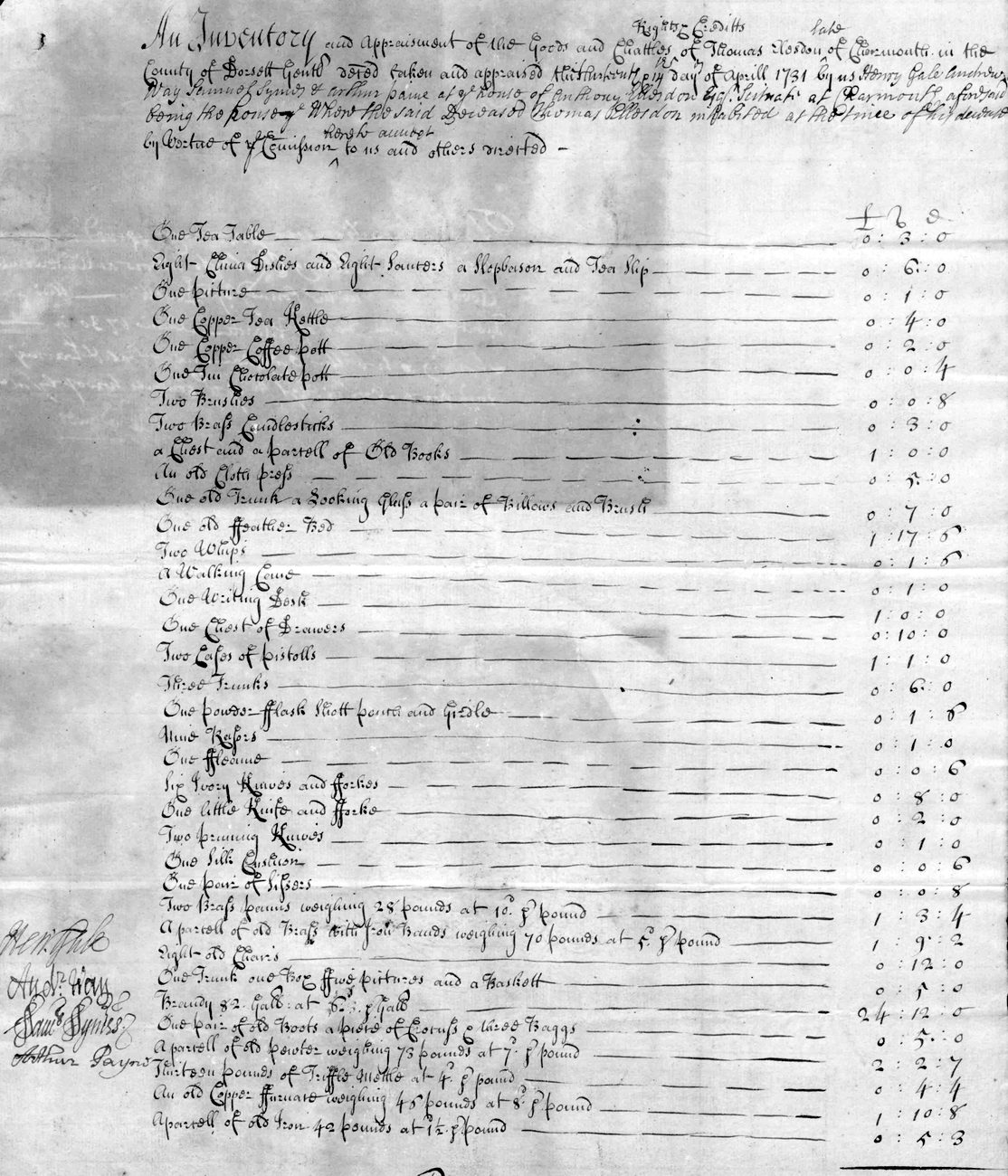 |
|||||||||||||||||||
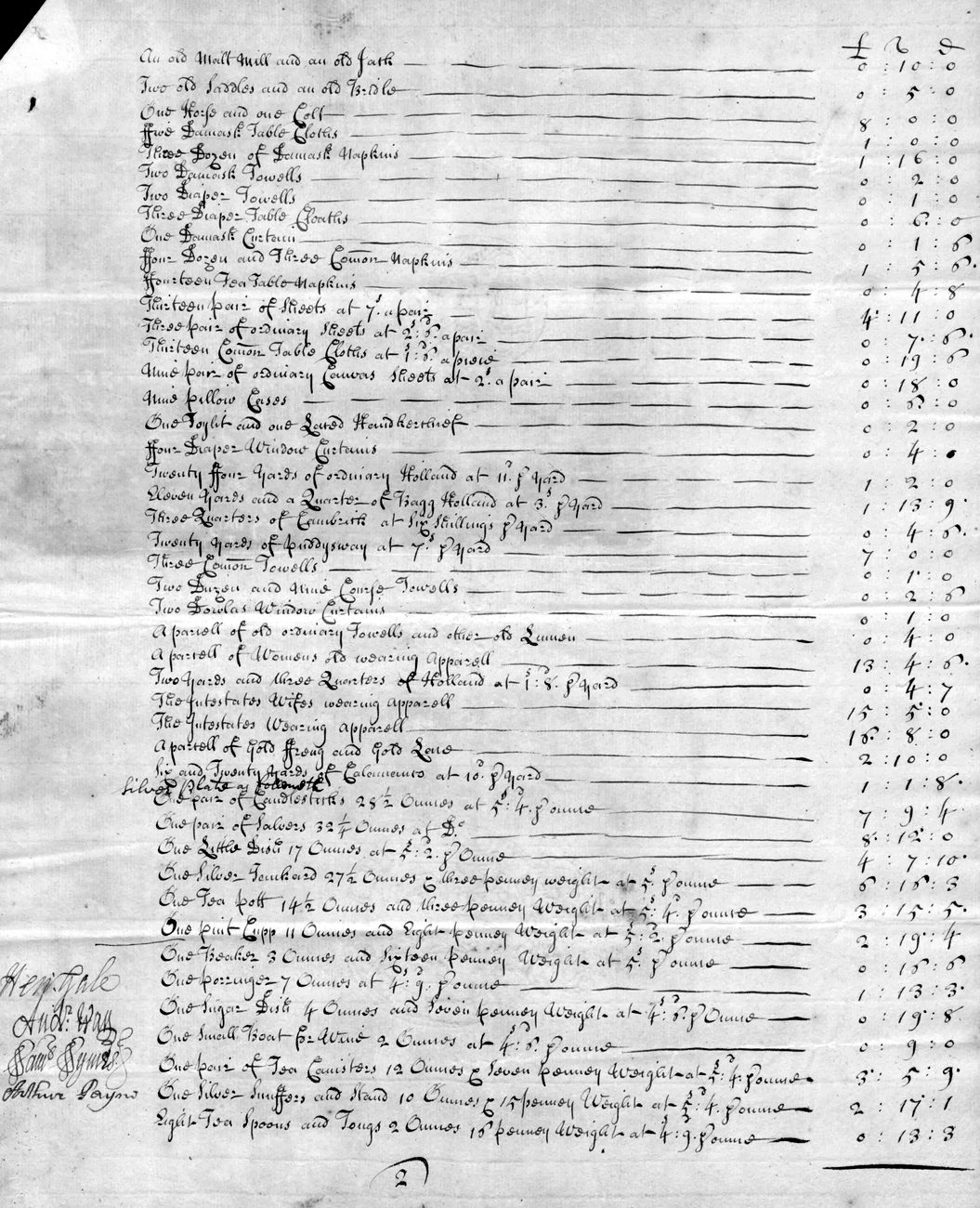 |
|||||||||||||||||||
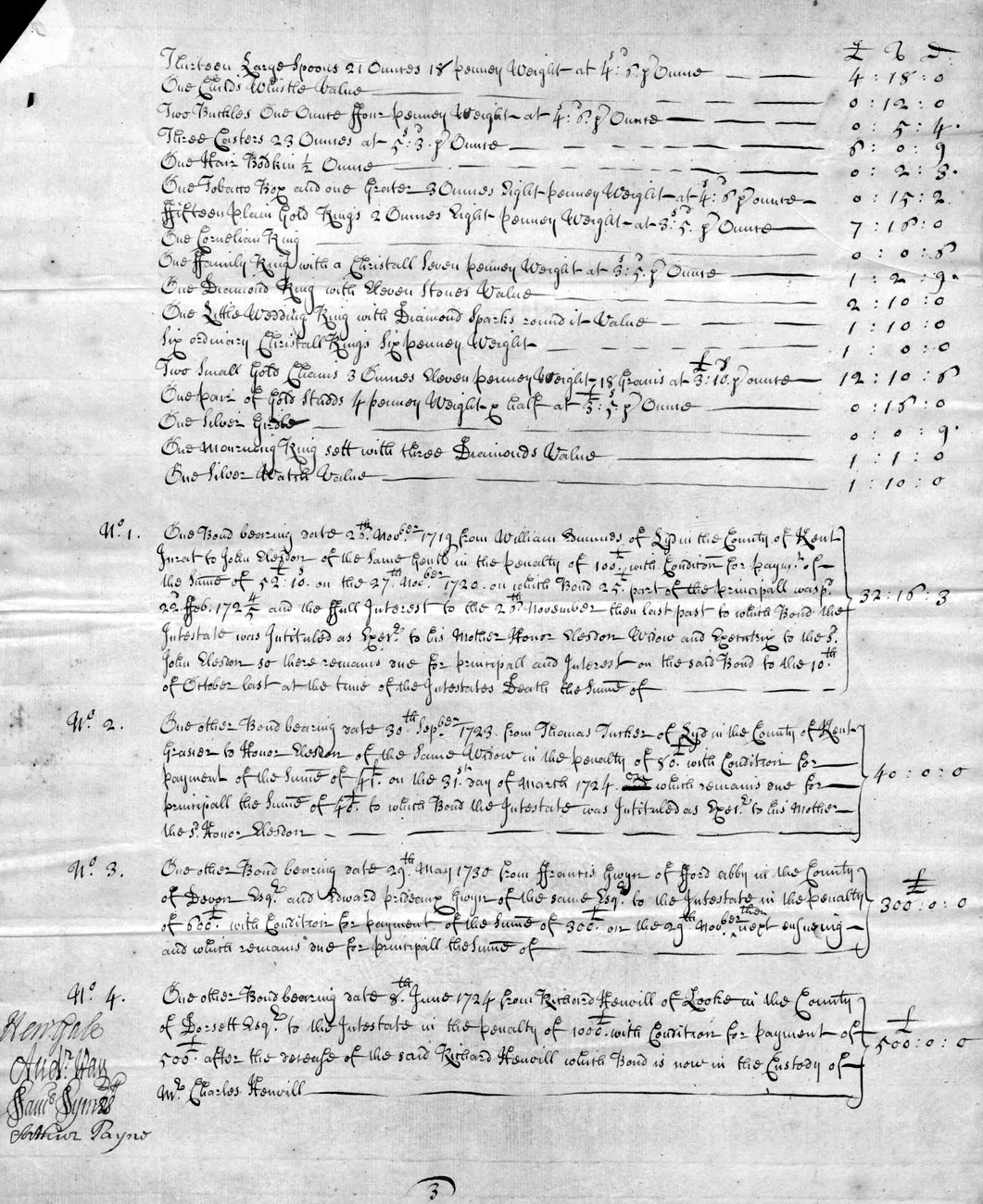 |
|||||||||||||||||||
 |
|||||||||||||||||||
An Inventory and apportionment of the Goods and Chattels of Thomas Ellesdon, late of Charmouth , in the County of Dorset, Gent. Were taken and appraised in 1731 at the house of Anthony Ellesden situate at Charmouth, being the house where the deceased Thomas Ellesdon inhabited at the time of his death. by vertue of ye …enission to us hereby … and others .. includes pistols, jewellery 25 gold rings, large quantity of Gold and Silver items listed by weight |
|||||||||||||||||||
William Ellesden`s grants to citizens of Lyme Regis permission to remove stones, etc from Charmouth foreshore in 1663 THIS INDENTURE made the first day of September In the fourteenth year of the reign of our Sovereign Lord Charles II (1663) by the grace of God of England Scotland France and Ireland King Defender of the Faith BETWEEN WILLIAM ELLESDON of Oharmouth In the County of Dorset Gentleman Lord of the said Manor of Charmouth and Anne his life of the one part and John Eyres, Gentleman Mayor and the Capital Burgesses of Lyme Regis In the said County of the other part WITNESSETH that the said William Ellesdon and Anne his Wife for and In consideration of the sum of £9 of lawful money of England to the said William by the said Mayor and Capital Burgesses before the sealing and delivery hereof well and truly paid the receipt whereof the said William Ellesdon doth hereby acknowledge and thereof and of every part and parcel thereof doth remit release exonerate acquit and discharge the said Mayor and Burgesses their and every of their heirs executors administrators successors and assigns by these presents have demised granted leased set and to farm let and by these presents do demise grant lease set and to farm let unto the said Mayor A Burgesses aforesaid ALL THAT the havens mouth the beaoh and the strand and all other the lands Situated under the Cliffs in the Parish of Oharmouth and which are there about or near the havens mouth in the said parish of Oharmouth and under ths Cliff there by what name or names so ever the same are or may he called or known being the place or places where sand for building or for other uses hath been heretofore fetched taken or carried or hereafter may be fetched taken or carried on or near or anywhere by one Close or parcel of land late in the possession of Ignatius Turner his assigns or asslgnees |
|||||||||||||||||||
| A page from Thomas Ellesdens comprehensive Will and Probate for 1730 which lists all his possessions and finances including a loan to his brother in law, Richard Henvill of £1000. | |||||||||||||||||||
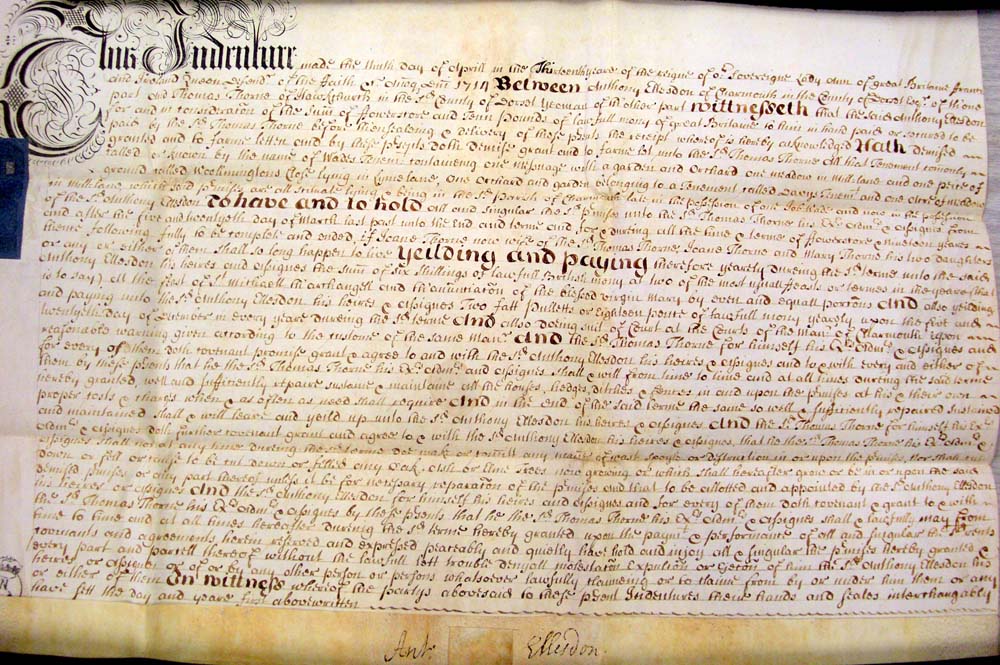 |
|||||||||||||||||||
| An Indenture April 1714 between Anthony Ellesden of Charmouth and Thomas Thorne of Hawkchurch for a Tenement known by the name of Wade`s tenement containing one messuage with a garden and orchard and meadow in Mill Lane (now Lower Sea Lane).
This Indenture made the Ninth day of April 1714 between Anthony Ellesden of Charmouth in the County of Dorset Esq. Of the one part and Thomas Thorne of Hawkchurch in the said County of Dorset, Yeoman of the other part witnesses that the said Anthony Ellesden for and in the consideration of the sum of four score and ten pounds (£90) of lawful money of Great Britain to him in hand paid by the said Thomas Thorne before the sealing & delivery of those present the receipt where of is hereby acknowledged Hath demised granted and to favour letten and by those present doth demise grant and to favour lot unto said Thomas Thorne all that Tenement commonly called or known by the name of Wade`s tenement containing one messuage with a garden and orchard and meadow in Mill Lane and one piece of ground called Woolmingtons Close lying in Lyme Lane, one orchard and garden belonging to a tenement called Davy`s Tenement and one close of meadow in Mill Lane which said premises are all situate lying and being in the said parish of Charmouth late in the possession of one Job Wade and now in the possession of the said Anthony Ellesdon to have and to hold all and singular the said premises unto the said Thomas Thorne his Executors, Administrators and Assigns from and after the 25th March last past unto the end and term and .. If Joane Thorne, now wife of the said Thomas, Joane Thorne and Mary Thorne, his two daughters or any or either of them shall happen to live yielding and paying therefore yearly during the said term unto the said Anthon Ellesden , his heirs ands assigns the sum of six shillings of lawful British money at two of the most usual feast days and paying two fat pullets or 18 pence of lawful money yearly ……… Anthony Ellesdon ) Wades Tenement, containing messuage, garden, orchard, meadow in Mill Lane, ground called Woolmington's in Lyme Lane, orchard and garden belonging to Davys Tenement, 1714 (Ellesdon to Thorne); will of Thos Thorne of Charmouth 1743 proved 1748 |
|||||||||||||||||||
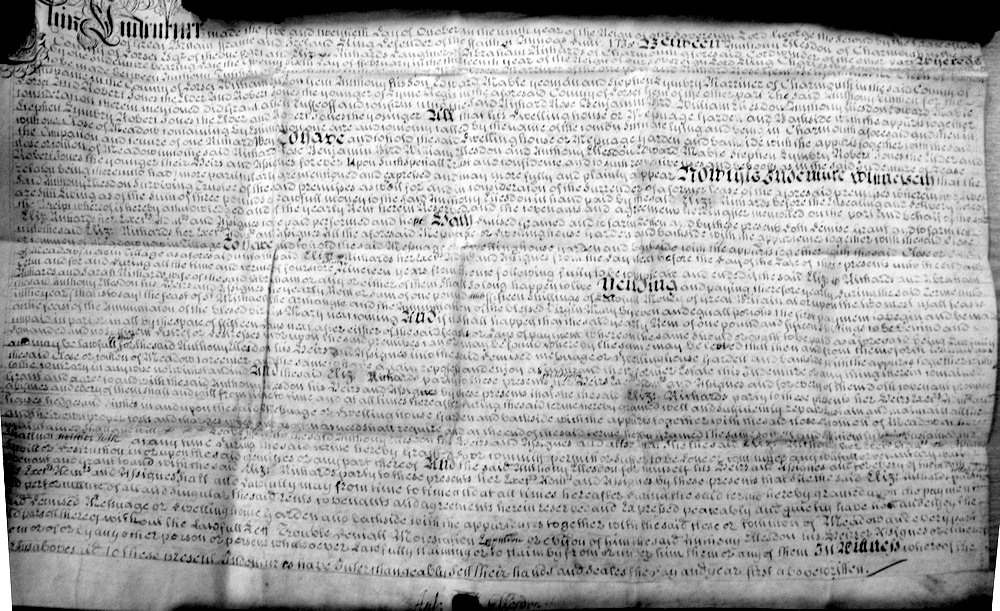 |
|||||||||||||||||||
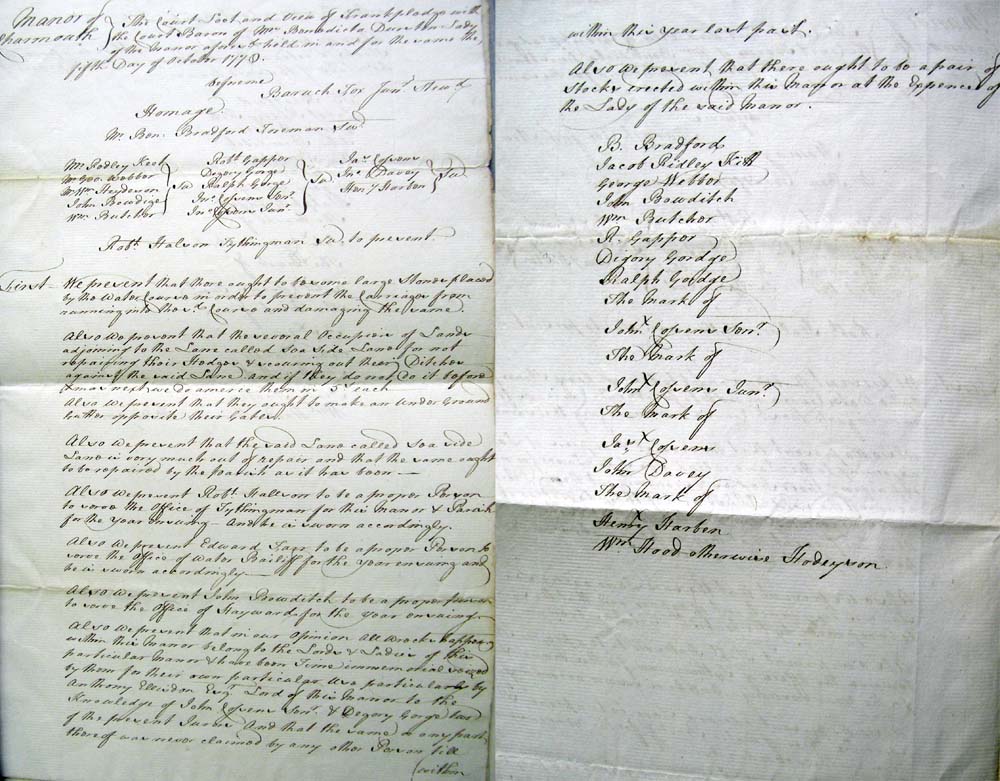 |
|||||||||||||||||||
| At a Court Leet held in 1770,in consideration of a good road being made in the lane leading to the sea at the cost and expense of the Parishioners, she renounced all the rights and titles to the lane, with all wrecks, stone, sand, and sea weed during her life time. | |||||||||||||||||||
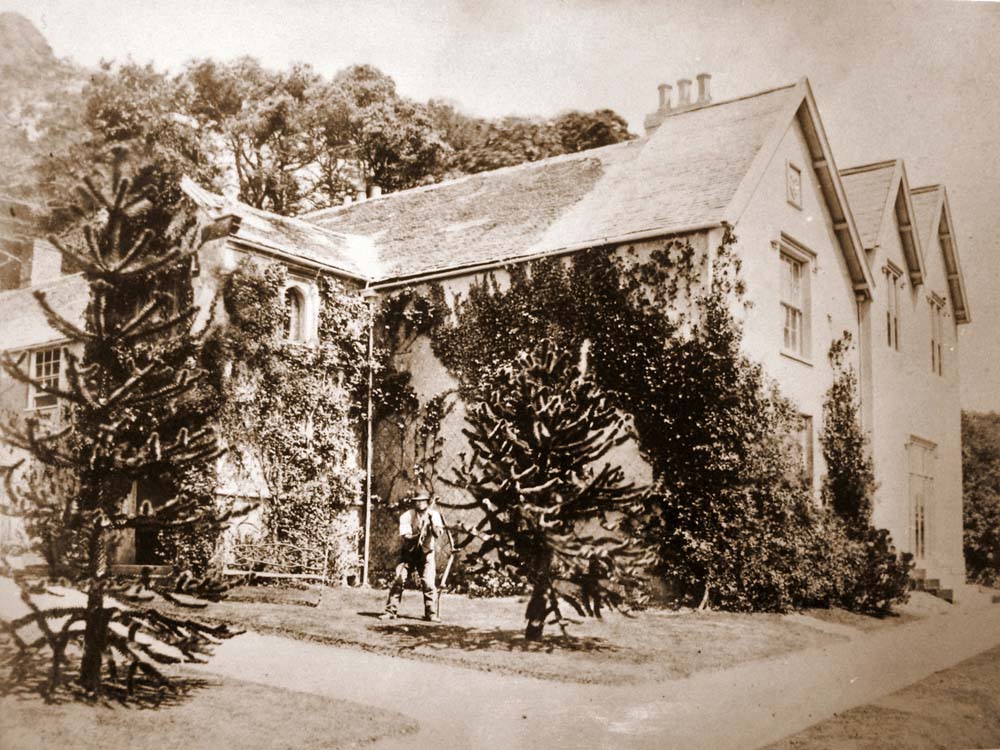 |
|||||||||||||||||||
| Catherstone Manor as it was in the time of the Henvills, before being rebuilt at the end of the 19 th century. | |||||||||||||||||||
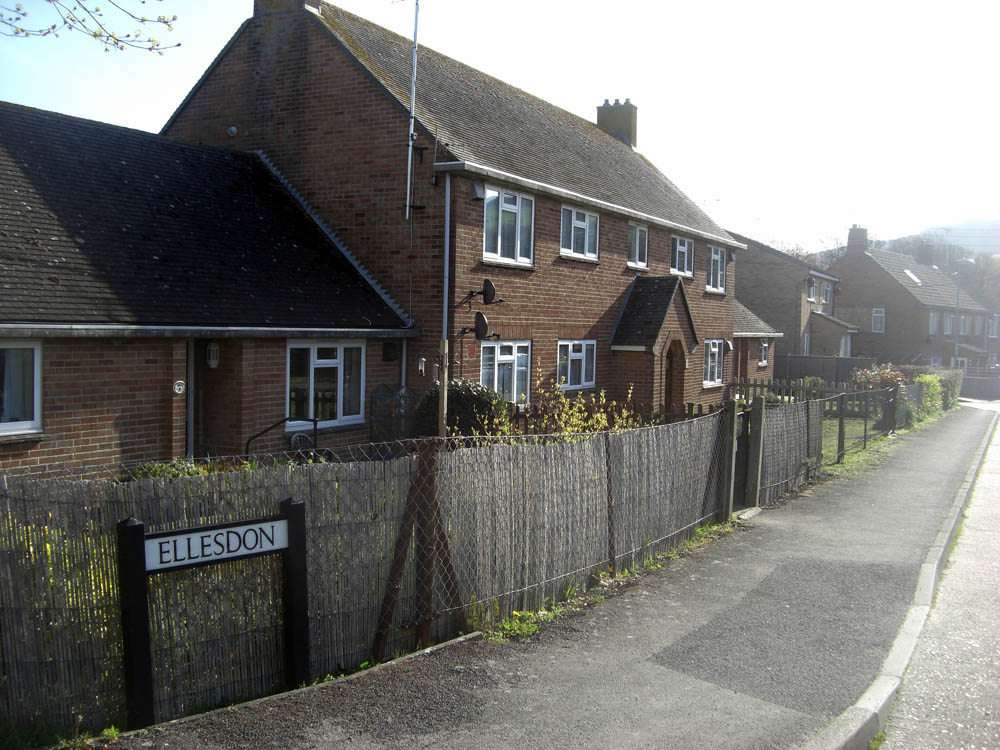 |
|||||||||||||||||||
| The Road named Ellesdon is a reminder today of this important family. | |||||||||||||||||||
 |
|||||||||||||||||||
| Ricahrd Henvill | |||||||||||||||||||
.jpg) |
|||||||||||||||||||
Ricbard Henvills Will - 1692 |
|||||||||||||||||||
| 14. Presentment by the Comrs of Customs to the Lords of the Treasury, as to an assault made upon the riding officers employed on the coast of Kent, by persons therein named, who were employed by Julius Deeds, Esq., the Mayor of Hythe, and who beat and wounded the officers to the hazard of their lives, and rescued 16 bags of wool, which they had seized in Scotney barn, belonging to the said Mayor; praying for exemplary punishment of the offenders. Dated 13 April 1692. Minuted:—“A report to be prepared for the Council.” Accompanied by:— Depositions of various persons as to assaults committed on them and others by one John Ellesdon, of Lydd, gent., who, with other persons, was engaged in having the wools removed in waggons. Dated 25 and 26 March 1692. 6 pages. |
|||||||||||||||||||
Burials at Lydd. William ELLESDEN 1706 Mar 21 eldest son of Ellesden |
|||||||||||||||||||
| Ellesdon, Anthony, 107, 108, 109; Ralph, 107, 108; Thomas, 107, 108; William, 107, 108
A SERIES OF FULLY ILLUSTRATED GUIDES TO THE MONUMENTAL BRASSES OF THE BRITISH ISLES |
|||||||||||||||||||
.jpg) |
|||||||||||||||||||
The Registers of Wadham College |
|||||||||||||||||||
An Inventory and apportionment of the Goods and Chattels of Thomas Ellesdon, late of Charmouth , in the County of Dorset, Gent. Were taken and appraised in 1731 at the house of Anthony Ellesden situate at Charmouth, being the house where the deceased Thomas Ellesdon inhabited at the time of his death. by vertue of ye …enission to us hereby … and others .. includes pistols, jewellery 25 gold rings, large quantity of Gold and Silver items listed by weight I bond 1719 William Simmonds of Lydd in Kent to John Ellesdon of same place … to his mothers Honor Ellesdon, widow and executrix to said John Ellesdon -£33 1 Bond 1729 from Thomas Tucker of Lydd grandson to Honor Ellesden to his mother the said Honor Ellesdon - £40 1 Bond 1730 Francis Gwyn of Ford Abbey and Edward Prideaux Gwyn - £300 1 Bond 1724 from Richard Henvill of Looke in Dorset this bond in the custody of Mr Charles Henvill - £500 1 note of hand one note of hand from George Coad to the Intestate 1730 - £74 for wool of the Intestate s sold to George Coad Junior for which he has drawn a bill dated 17 feb , 1730 on George Coad Father payable to Anthony Ellesdon Esq three months after date - £55 Money found in the deceased furniture which is now in the hands of Anthony Ellesden esq. - £5 1 lease of a house in Lydd for a term of 99 years - £50 Hutchins writes: Adjoining Charmouth, on the east side of the river is a farm called Newlands, anciently part of this manor, but severed there from by Sir William Poole, knt. Who 32 Eliz. Conveyed it in fee to William Wadham of Catherstone. In 1599 it was granted by George and William Wadham his son and heir apparent to John Jeffrey, Esq. By 1649 it was sold to Anthony Ellesden, from whose grandson of the same it passed to the Henvills, and in 1790 was held by Mr Coade of Lyme Regis. |
|||||||||||||||||||
 |
|||||||||||||||||||
 |
|||||||||||||||||||
 |
|||||||||||||||||||
| An Abstract from the will of Honora, the wife of John is full of information about the family who seem to have property both in Dorset and around Lydd in Kent. She leaves her wealth to her eldest son Thomas and his brother Anthony in 1725. Again the Will of Thomas Ellesdon has survived with a detailed Inventory of his possessions and properties. He spends his last days at his uncle Anthony's Manor House in the year 1730. He has considerable wealth, which includes gold and silver jewellery that is shown by its weight. This and his mother's inheritance were to all go Anthony. | |||||||||||||||||||
| 13 Sep 2017 - Honour CLAPCOTT, d. Between 4 Nov 1724 and 20 Aug 1725. Married, Est 1680. Some Chancery Court docs (not yet seen) refer to John Ellesdon and his wife Honour, and the dates are appropriate for this John and his wife. A widow Honour of Lydd left a will (1725), mentioning sons Thomas and Anthony .. | |||||||||||||||||||
 |
|||||||||||||||||||
| 1679 John Ellesdon and Honour Clapcott were married 2nd May at Winterborne Steepleton. | |||||||||||||||||||
.jpg) |
|||||||||||||||||||
| 1685 March 23 Charles Clapcott (Clapgut) Ellesdon son of Mr. John and Honour, his wife was baptised at Charminster Church. A widow Honour of Lydd left a will (1725), mentioning sons Thomas and Anthony. A John of Lydd also left a will in 1715; an unnamed wife mentioned but no children so I am guessing that that John was a son of John and Honour and not the husband of Honour. |
|||||||||||||||||||
Assessment Commissioners. 1665Ordered, That John Prayter be added to the List of Commissioners Names for the County of Suffolke. ¶Ordered, That Captain John Ellesden be added a Commissioner for the County of Somersett. |
|||||||||||||||||||
| Treasurer Danby directs the weekly payments out of the Customs to the Wardrobe to be stopped till further order. Mr. Ellesden's request touching the commencement of the pension of 100l. per an. is to be put upon the papers for the King. [Ibid. p. 258.] |
|||||||||||||||||||
| Warrant to Auditor Beale to allow 311l. to Mr. Ellesden according to His Majesty's direction. Beale to speak with Sir G. Downing about it: it being a matter of nicety. 1668.Mr. Ellesden to stay till this day week for an answer from the people of Lyme, and then my Lords will put an end to this business. Charnock to draw a privy seal for 300l. forgiven the said Ellesdenon the bond for 600l. on the Customs. 1668 | |||||||||||||||||||
| Mr. Ellesden's petition read about a lease of the stone in Portland [Isle], together with the report from Sir John Denham and Sir C. Harbord thereupon. Mr. Ellesden says none can dig but by the King's warrant from Sir J. Denham. Lord Ashley says any may dig. Mr. Ellesden to attend on Monday hereon with Sir John Denham and Mr. Oliver, the city surveyor. September 1668 | |||||||||||||||||||
| Same from Col. Robert Mohun setting forth articles against John Ellesden, who was put into the place of Collector of Customs of Lyme by Cromwell. Referred: to the Customs Commissioners, who are to have regard to His Majesty's letters of recommendation of petitioner to them. [Ibid. p. 48.] 1660 | |||||||||||||||||||
| Money warrant for 150l. to William Ellesden for 1 years to Lady Day last, on two several annuities of 50l. each for the use of Anthony and Charles Ellesden his sons : and dormant warrant for payment of said annuities in future.1674 | |||||||||||||||||||
| Same to the Attorney or Solicitor General for a great seal for a grant of a yearly pension of 100l. for life to William Ellesdon and Joan his wife and the longest liver of them, payable quarterly out of the Customs of Lyme Regis port : the King with a very great sense reflecting upon the fidelity and services of said Ellesdon, who was contributing to the King's safety after the fatal battle of Worcester : to commence at (commencing the first payment from) Christmas last. (Treasurer Danby's subscription dated April of docquet hereof. Warrant dormant dated June 18 from Treasurer Danby to Richard Kent, Receiver General and Cashier of Customs, to cause payment to be made to said William and Joane Ellesden of all such moneys as are and shall from time to time grow due as above. This warrant quotes the great seal as dated May 11 inst. [sic for ult.] Charles Bertie dated June 20 to the Customs Cashier to pay same.) 1678 | |||||||||||||||||||
| My Lords leave it to the Customs Commissioners to do what they think reasonable upon the complaint against Capt. Ellesden. 1700 | |||||||||||||||||||
| homas Coxhall of Lydd, husbandman, told the customs officer John Ellesdon that “Mr. Deedes was a gentleman he had earned a great deal of money of and by this [assisting in the raid] he might lose his work and incur his displeasure.”38 The prohibition of trade with France was especially damaging to the livelihoods of ... | |||||||||||||||||||
8th June 1648 |
|||||||||||||||||||
| Mr. Pley and Mr. Ellesden are called in upon a debt of 2,500l., due to the King from said Pley as collector of Customs at Weymouth, and pray an allowance of a Navy bill of about 950l. and of 1,900l. [in] money due upon a privy seal, besides interest, towards satisfaction of said debt due on said Pley's collection. Treasurer Danby upon hearing the matter refers it to the Commissioners of the Navy to make a state thereof, and what imprests have been made out thereupon : and Treasurer Danby to speak with the Customs Commissioners on Monday next [concerning the same]. 1677 | |||||||||||||||||||
| Treasurer Danby directs the weekly payments out of the Customs to the Wardrobe to be stopped till further order. Mr. Ellesden's request touching the commencement of the pension of 100l. per an. is to be put upon the papers for the King. [Ibid. p. 258.] 1677 |
|||||||||||||||||||
| Capt. Ellesden says Jones and Mark Serjeant [struck through] told him what Catt said and Ellesdenwent into Sussex to examine the matter and Catt told him he came off with paying and had no letter of licence: that he made up the matter with Capt. Baker and it cost him 40l. "What did you give C[apt.] Baker?" He said, I am under an oath of secrecy not to discover: that C[apt.] Baker sent a letter to the gaol keeper upon which he was discharged and gave no bail. 1700 | |||||||||||||||||||
| Same to the Attorney or Solicitor General for a great seal for a grant or confirmation to Joane Ellesdon, Antho. Ellesden, Cha. Ellesden, Ann Ellesden and Mary Ellesden of their pensions ut supra, pp. 283–4, and for payment of the arrears thereon from 1683, Christmas, out of the Customs of Lyme port except such duties as are appropriated by Act of Parliament: their father, William Ellesdon, being lately deceased. October 6th 1685. | |||||||||||||||||||
| Present : ut supra. [My Lord directs] 1500l. to be imprested to the Cofferer against her Majesty's remove to Winchester. The landwaiter at Weymouth is to be searcher in the room of Mr. Ellesden deceased, and Mr. Wilkins is to be presented for the [said] landwaiter's place. Ibid. 1700 |
|||||||||||||||||||
| Appending: the first of the above presentments, to wit that dated March 9 last made upon the Treasury order of 1698 Dec. 16 on the petition of merchants and others interested in the woollen manufacture who suggest that great quantities of wool and wool pelts have been lately conveyed out of Northumberland to Scotland and thence transported to foreign parts. Hereupon the Customs Commissioners report that they received information of the said frauds. On the 30 Dec. 1697 they gave Commission to certain Excise officers there and in the following March they despatched Mr. Warnford as riding surveyor to superintend Cumberland and Northumberland and afterwards viz. on the 6th and 13th August 1698 (upon publication of the Act of last Session for explaining &c. the acts against transportation of wool) they directed Mr. Norman, collector of Berwick port and the said Warnford to report the posts of the officers and the description of the open roads leading from England into Scotland and sent him a form for the registering of wool in accordance with the Act. In the following month they sent Capt. Ellesden [thither] who had well approved himself in opposing that trade in another part of the kingdom. We then received the abovesaid petition of the merchants. We desired Sir Benjamin Ayloff, one of the Commissioners in the first-named Act, to explain their intentions. Thereupon on Jan. 12 last he produced to us the resolution of a committee of the said Commissioners of Dec. 30 last comprehending the number, charge and station of the officers proposed by them for this service. But we see no cause for their appointing so many officers at a greater distance than 15 miles from the Scottish border nor in the ports where Customs officers are established. But seeing that a register of all wool growing within 15 miles of the border is now required by Act of Parliament and that the practice of importing wool by land into Scotland is so much increased we think that the established officers are insufficient. If the care of the said Register of wool be committed to these gentlemen as well as the guard of the inland border, the sum proposed by them viz. 2000l. per an. is reasonable. Out Letters (Customs)XIV, p. 23–5. 1699 | |||||||||||||||||||
|
|||||||||||||||||||
.jpg) |
|||||||||||||||||||
| Anthony Ellesdon the son of William Ellesdon Esq, was born 28th May 1659 in Charmouth | |||||||||||||||||||
 |
|||||||||||||||||||
| Charles Ellesdon the son of William Ellesdon Esq, was born 2nd June 1661 in Charmouth | |||||||||||||||||||
 |
|||||||||||||||||||
| Anthony the son of William Ellesdon, Gentleman, was born May 20 and baptisied June 24th in Lyme Regis.1654 | |||||||||||||||||||
| 1684 Anthony Ellesdon born to John and Honor Ellesdon at Charminster | |||||||||||||||||||
| 1685 Charles Ellesdon born to John Clapcott and Honor Ellesdon at Charminster | |||||||||||||||||||
| Charles II March 1674 March 1674 [March ?] William Ellesden to the King. Petition, stating a grant dated 17 Dec. 1669, to the petitioner's two sons, Anthony and Charles, of a pension of 50 l. | |||||||||||||||||||
| 1702 Anthony and Charles Ellesden, pension of 100l. per an.; arrears, 12 years and 73 days ut supra Ann and Mary Ellesden, pension of 100l. per an.; arrears 12 years and 73 days ut supra |
|||||||||||||||||||
| Henry to John and Honor Ellesden 1680 Winterborne | |||||||||||||||||||
| Anthony to John and Honor in 1696 at Lydd. | |||||||||||||||||||
| Captain John Ellesden died at Lydd in 1714 | |||||||||||||||||||
| William son of Capatin John Ellesen died at Lydd in 1707 | |||||||||||||||||||
| winterbourne Abbas Monuments and Floor-slabs. Monuments: In nave—on E. wall, (1) to William Davis, 1814, and William his son, 1840, stone tablet with cinquefoil arched frame; on S. wall, (2) to Grace wife of Charles Henville, 1847, white marble tablet on veined marble backing. In churchyard—W. of porch, (3) to Elianor wife of Henry Clapcott, 1719, table-tomb with fielded panelled sides and ends; (4) to [S]arah wife of William Clapcot, 1704, and Henry Clapcot, 1716, table-tomb with arcaded sides and scrolled ends | |||||||||||||||||||
he election of 1620 may have been contested, but if so no firm details have emerged. On 18 Dec. the corporation resolved that: if Mr. Anthony Ellesdon, mayor, shall be in any sort questioned or put to any expenses at any time hereafter concerning the election of the burgesses or any one of them which were chosen upon Saturday last to serve at the next Parliament, … the said Anthony Ellesdon’s charges shall be borne and defrayed at the general charge of the whole corporation.10 |
|||||||||||||||||||
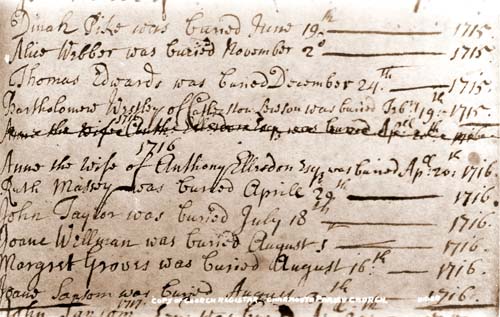 |
|||||||||||||||||||
Record of Death of Anne, Widow of Anthony Ellesdon in 1716 |
|||||||||||||||||||
.jpg) |
|||||||||||||||||||
Mrs Mary Ellesdon was buried September 22nd 1728. |
|||||||||||||||||||
 |
|||||||||||||||||||
| Anthony Ellesdon Esq. Lord of the Manor of Charmouth in the County of Dorset by his Deputation dated the first of August 1729 doth appoint Thomas Ellesdon of Charmouth of Charmouth aforesaid to be his Game Keeper within the said Manor. | |||||||||||||||||||
 |
|||||||||||||||||||
| "Anthony Ellesdon Esqr: of the parish of Charmouth in the County of Dorset & Ann Gale of the parish of Bishops Hull in the county of Somerset were marry'd by Licence Feb: 14: 1706/7 at Angersleigh, near Taunton. Petrus Gale was the Rector. | |||||||||||||||||||
|
|||||||||||||||||||
| 27th October 1656 Attested Copy of Indenture of Release whereby William Ellesdon in consideration of a marriage between him and his wife released and conveyed the Manor and Adowson of Charmouth to Roger Gale, Walter West and Anias Short at by way of settlement 29th November | |||||||||||||||||||
1726 Thomas Ellesdon married Mary Henvill at Allington, near Bridport. |
|||||||||||||||||||
.jpg) |
|||||||||||||||||||
1760 Mr Charles Henvill was buried at Charmouth. |
|||||||||||||||||||
 |
|||||||||||||||||||
Elizabeth Henvill buried in Charmouth in 1770 |
|||||||||||||||||||
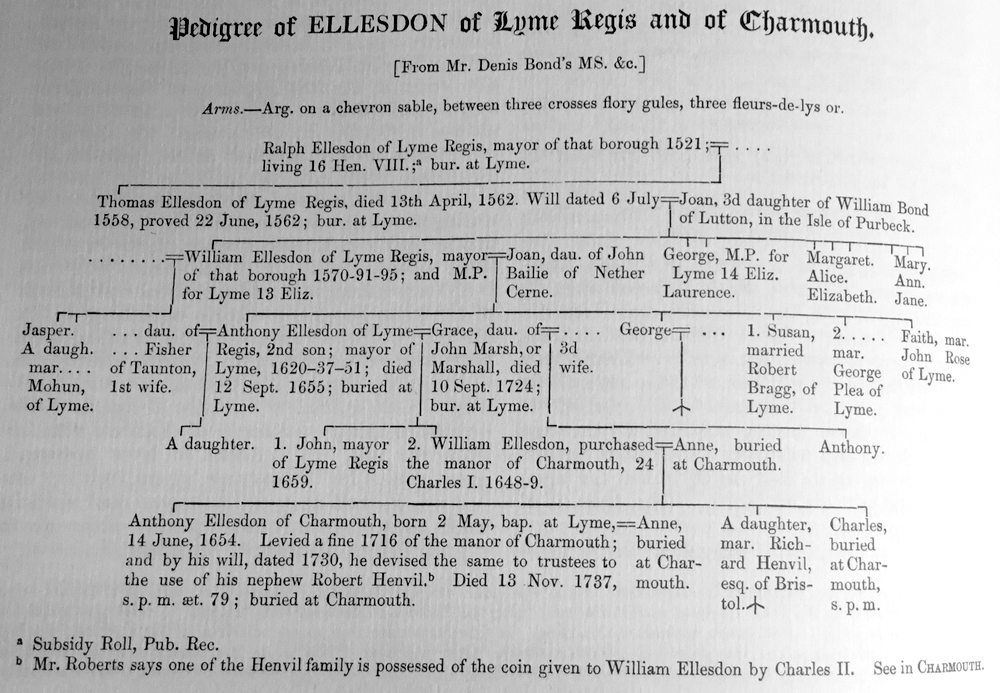 |
|||||||||||||||||||
.jpg) |
|||||||||||||||||||
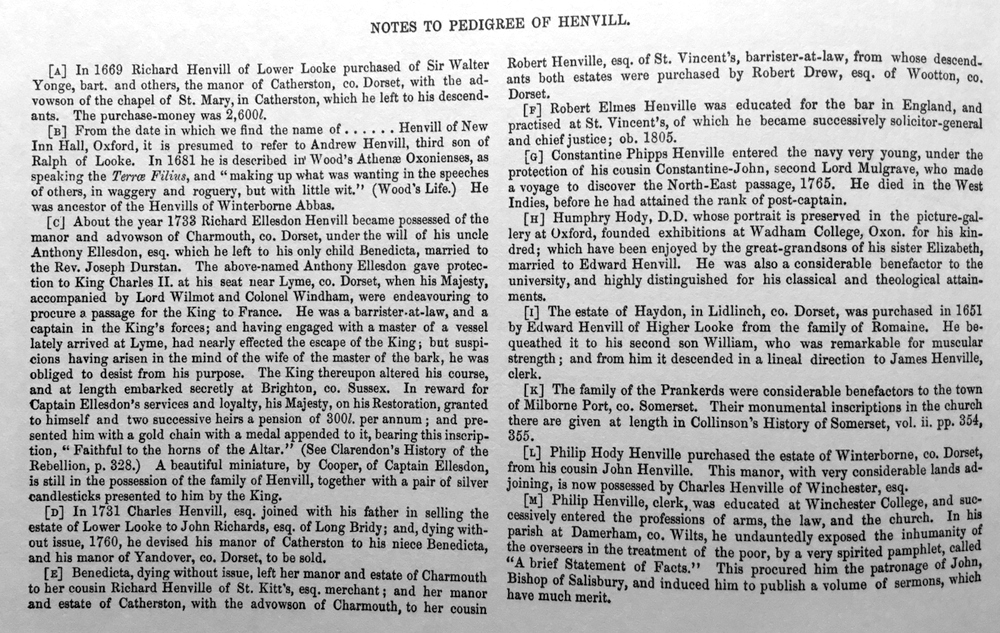 |
|||||||||||||||||||
When Anthony Ellesdon died in 1737 at the fine age of 79 he had outlived his wife Anne, who had died in 1717 and had no children to leave his estate to. It may well have gone to his nephew Thomas Ellesdon, son of his brother, Captain John and his wife Honour who lived at Lydd in Kent. He had moved to Charmouth in 1726 on marrying Mary Henvill, a widow, who lived in the village and was related to his aunt Mary who was married to Richard Henvill. He had inherited a large estate and wealth on the death of his mother in 1725. Unfortunately, his wife died two years after their marriage and he in 1731. His Will and list of belongings which is quite substantial was left to his uncle. Anthonys other brothers and sisters had all passed on by the time he died, and he chose the eldest son of his sister Mary Ellesdon to inherit his large Estate. The Henvilles lived at Looke near Abbotsbury but had a number of other properties. These included Catherston, adjoining Charmouth. Richard Henvill had paid £2000 for it in 1669 and his son Richard was living there when he met and married Mary Ellesdon. The parish records for Wootton Fitzpaine show that their eldest son, Richard was baptised there in 1685, as were three more children. The family later moved to their father’s house at Looke and built themselves a substantial Mansion, which still bears their initials above the doorway, R and M.H 1711, which no doubt was when it was built. Their son, Charles Henvill married Elizabeth Hodder of Charmouth and were to live in the Manor House at Catherston until his death in 1760 and hers 10 years later. Another daughter, Margaret remained in Abbotsbury until her death in 1747. |
|||||||||||||||||||
| When Anthony Ellesdon died in 1737 he gave a substantial proportion of his wealth to his two nephews, Richard Ellesdon Henvill and Charles Henvill. It seems Charles was to stay in Charmouth and married Elizabeth Hodder and both were later buried here. His brother becomes Lord of the Manor, but it is probably Charles who lives in the Manor House. For Richard is often described as a Bristol Merchant and was very active in the Tobacco and Slave Trade. He was one of the agents who were responsible for outfitting the ships, making the arrangements for the supply and selling of slaves. He was a leading agent directing many slaving voyages. In 1744 he gives evidence to the Lords Commissioners for Trade and plantations that Bristol sent out 40 slave ships per year each with goods on board worth £4000. Another brother Robert lives at the time in St. Kitts in the West Indies. Richard is only Lord of the Manor for seven years and it is his 17-year-old daughter, Benedicta, who is to inherit the village. Later in 1760 she is left Catherstone on the death of her uncle Charles Henville. At the age of 36 she marries the Rev. Joseph Durston, but they are to have no children and she is widowed by 1770. She is no doubt living in the village either at Charmouth or Catherstone Manor as her signature appears on documents of the time. They reveal that in 1771, Thomas Rickard, her Steward was leasing the property on the corner of the Street and Lower Sea Lane, currently known today as the Pharmacy from her for 6d per annum. Another lease for the same year shows her owning the building that was known as the “Wander Inn” on the Street in Charmouth. At a Court Leet held in 1770,in consideration of a good road being made in the lane leading to the sea at the cost and expense of the Parishioners, she renounced all the rights and titles to the lane, with all wrecks, stone, sand, and sea weed during her life time. Her Will shows her leaving her Manor of Charmouth to her distant cousin Richard Henvill. The Manor of Catherstone was left to his brother, Robert who was a Barrister on the Island of St. Kitts. The Manor of Charmouth finally ends up being owned by a Merchant living with his family on the Island of St. Kitts in the West Indies. But it is only for four years as he is to die in 1788 and the Manor is put up for sale probably by Auction. The Ellesdons and their descendants owned the Village for over 130 years and Ellesdon Road is a reminder today of this important family. |
|||||||||||||||||||
| and brasses to Anna Henvill and Margaret Henvill, d. 1681: and to Ralph Henvill of Looke, gent. d. 9 Dec 1644: Litton Cheney brasses to Henvil of Looke and Pope, retroscripts, 29 273 -275 - Litton Cheyney | |||||||||||||||||||
| A small shallow circular bowl, with two handles, and embossed ornamentation, nearly 3in. diam., and one inch in height, marked with the leopard's head only. These vessels, sometimes called " tasters," were in use about the latter half of the 17th century, and are occasionally found amongst Church plate as gifts. At the bottom is inscribed, " Gift of Mr. Edward Henvill, 1716, to the Church of Litton." The date of this bowl, which is now used at private Communion, is probably somewhat earlier than this. The donor was buried here 6th April, 1716. " A silver Paten, with gadroon edge, 7^in. diam. It cover. is of the Britannia standard of the year 1700. is C. O. surmounted by a crown, that of John Cory. On the surface is engraved, " The Gift of Richard Henvell, of Loake,Gent., to the Parish Church of Litton." Below this is his coat of arms, A lion rampant between eight cross crosslets. Crest, An eagle's head between two 7i"ings. The Henvilles resided in an old family house here, nominally in Abbotsbury, but practically in Richard Henvill, of Lower Looke, born 1653, was High Sheriff of Dorset, 9th Geo. ist ; he died 1732. | |||||||||||||||||||
| Netherbury parish church of St. Mary: 5 Table Tombs 5–10 Metres East and South East of South Porch (Clift, Hearn, Crode, Henvill, Defaced) to john son of richard henvill,1702 richard 1776, son of john henvill and elizabeth his widow and other later tombs | |||||||||||||||||||
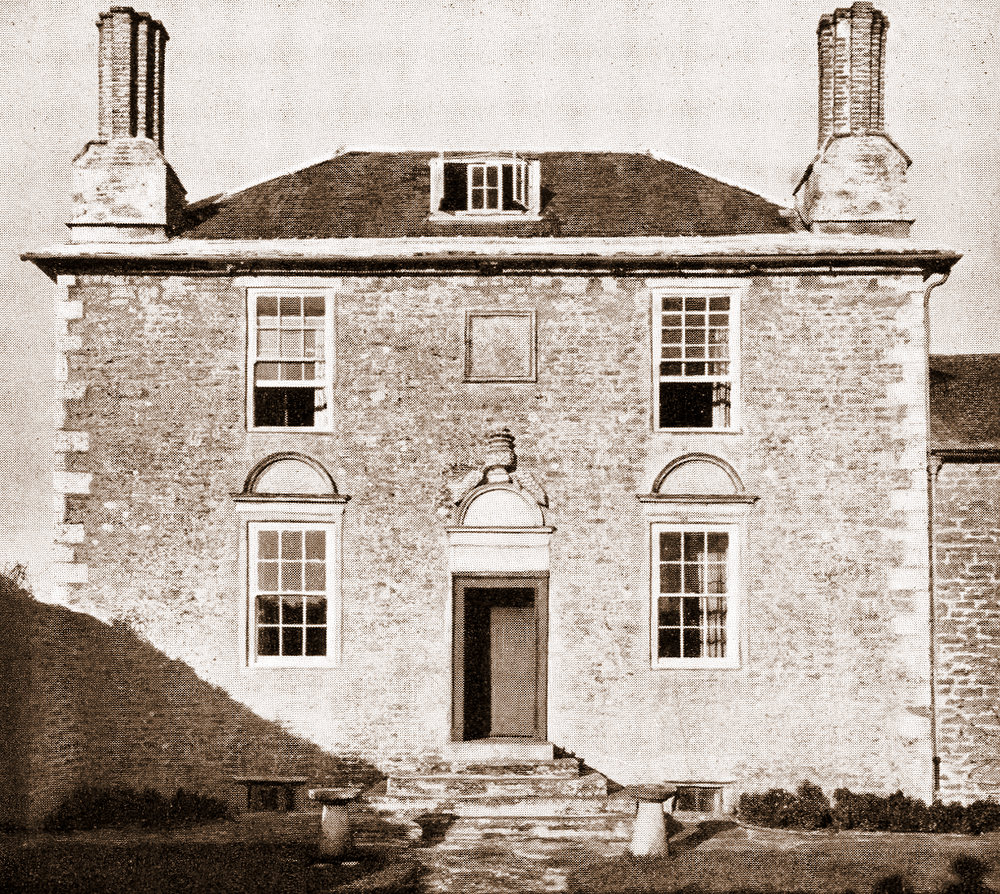 |
|||||||||||||||||||
 |
|||||||||||||||||||
 |
|||||||||||||||||||
Looke Farmhouse at Punknowle,
SY 58 NW PUNCKNOWLE LOOKE LANE 6/226 Looke Farmhouse 7-8-52 GV II* Detached Farmhouse. Dated R and M H 1700 on door lintel. |
|||||||||||||||||||
| House, 40 yards E. of (4), was built probably early in the 18th century but has been much altered. Over the doorway is a stone with the initials and date R.H. (perhaps for Ralph Henville) 1711. | |||||||||||||||||||
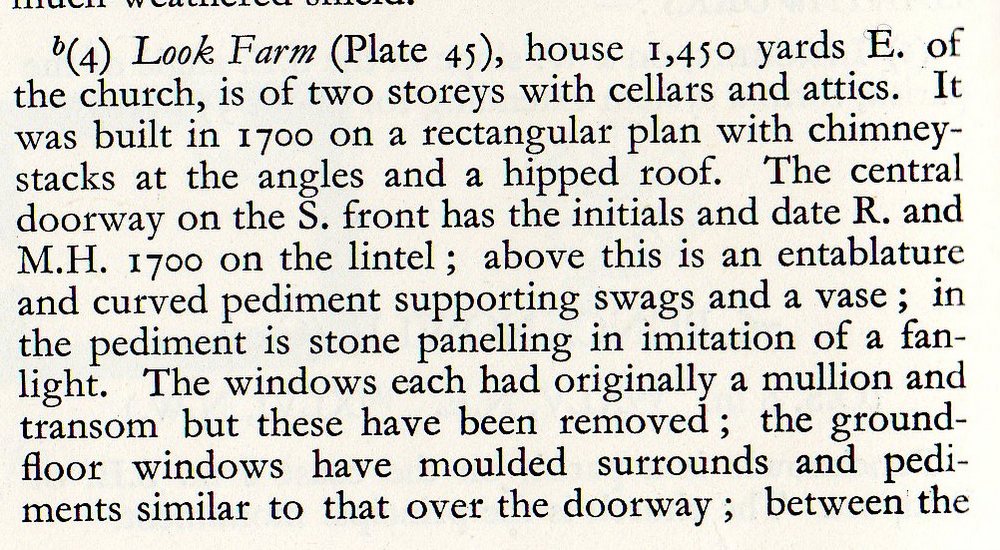 |
|||||||||||||||||||
| The initails are those of Richard and Mary Henvill. Mary was the daughter of William Ellesdon of Charmouth (see Hutchins Family Tree below). The house was sold by the family after he died in 1732. It was their son, Robert, a Merchant of Bristol who was to inherit the Ellesdon Estate in Charmouth on the death of Anthony Ellesdon, his uncle in 1737. | |||||||||||||||||||
| On the surface is engraved, “ The Gift of Richard Henvell, of Loake, Gent., to the Parish Church of Litton.” Below this is his coat of arms, A lion rampant between eight cross crosslets. Crest, An eagle's head between two wings. The Henvilles resided in an old family house here, nominally in Abbotsbury, but practically in Lytton. Richard Henvill, of Lower Looke, born 1653, was High Sheriff of Dorset, 9th Geo. 1st; he died 1732. | |||||||||||||||||||
| Puncknowle Burials: Frances Henvill 1717, Mrs Elizabeth Henvill 1739,Elizabeth Henvill 1744 | |||||||||||||||||||
| In 1647 the Manor of Catherstone was sold to Walter Yonge and Sir John Yonge. He in turn sold it in 1669 to Richard Henville, Esq of Looke, near Abbotsbury in Dorset. By 1783 it was sold again to William Drewe of New Inn, London. | |||||||||||||||||||
.jpg) |
|||||||||||||||||||
 |
|||||||||||||||||||
Copy lease for 1,000 years PC/CMO/21/8/1 1662 |
|||||||||||||||||||
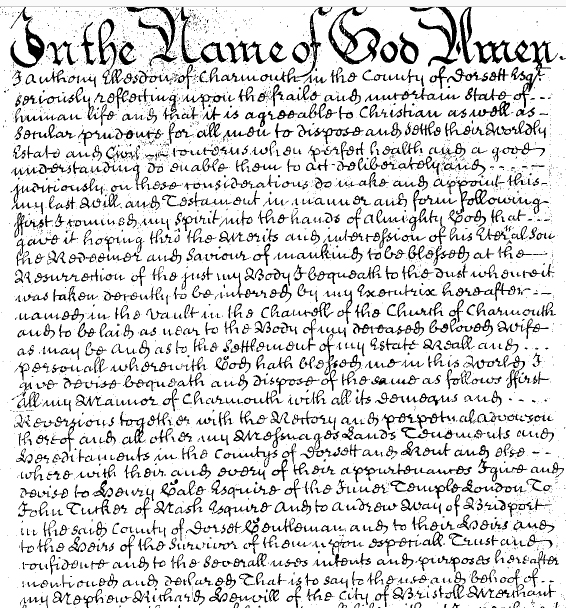 |
|||||||||||||||||||
| A Brief summary of Anthony Ellesdons Will above:
I Anthony Ellesdon of Charmouth, Esq. |
|||||||||||||||||||
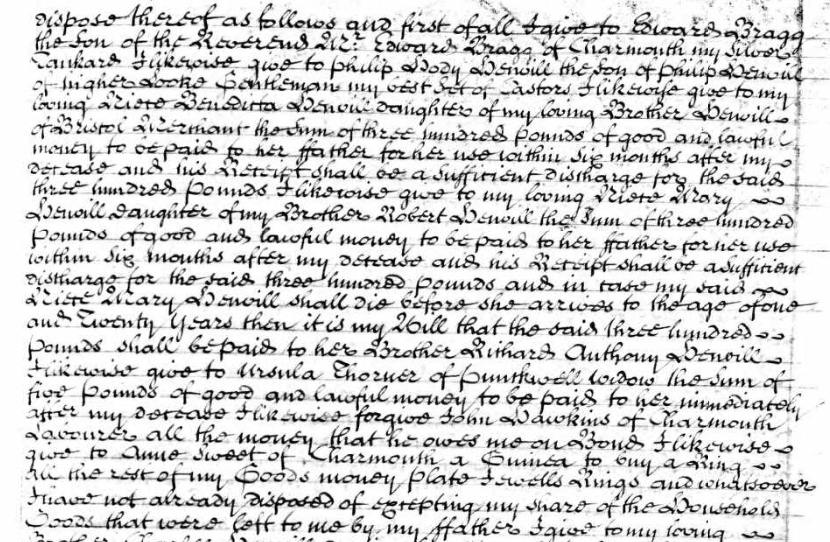 |
|||||||||||||||||||
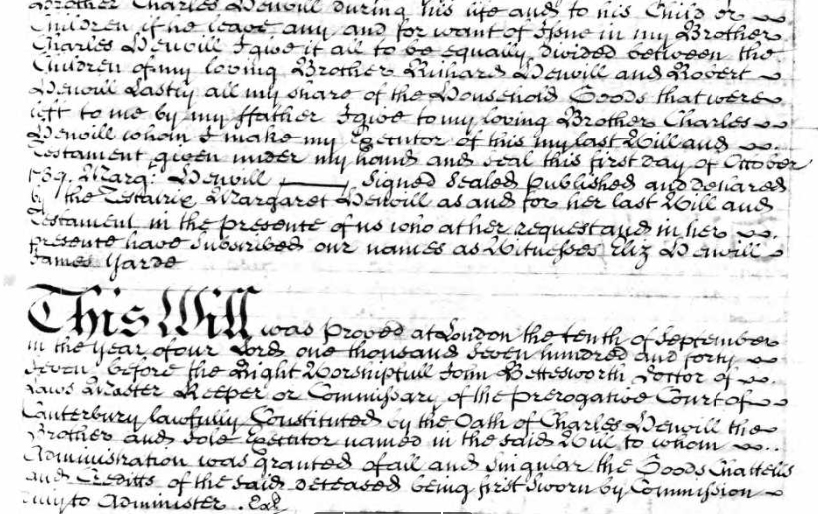 |
|||||||||||||||||||
Margaret Henvill`s Will of 1747 |
|||||||||||||||||||
¶Read likewise a letter from Mr. Henvill, Master of the Incorporated Society of Merchants at Bristol, dated at Merchants' Hall there, the 14th of September, 1744, in answer to one from the Secretary of this Board to the Mayor of Bristol, in June last, desiring some information from the principal traders to Africa in the said city, concerning the general state of that trade, the forts and settlements, etc. |
|||||||||||||||||||
| 50. [Elizabeth Henvill, daughter of Edward and Jane Henvill of Charminster, Dorset. 17th August, 180–. Aged 16. | |||||||||||||||||||
| Leeward Islands. Letter from James Verchild, esquire, Commander in Chief of the Leeward Islands, to the Board, dated November 19th, 1766, recommending Robert Henvill, esquire, to be of the Council for the Island of St. Christopher's. Leeward Islands. Letter from James Verchild, esquire, Commander in Chief of the Leeward Islands, to the Board, dated November 19th, 1766, relating to the state of the Council for St. Christopher's, and recommending Robert Henvill, esquire, to be appointed a councillor. fo. 67. Letter from Constantine Phipps, esquire, one of the Council for St. Christopher's, to the Secretary, dated February 12th, 1767, signifying his intention shortly to return to that island. |
|||||||||||||||||||
| 1689 Lyme Regis Election. It appeared, upon the Poll delivered in, That Sir Wm. Drake had Twenty-nine Votes, with himself; and that Mr. Burridgehad Thirty Votes, with himself: But it was allowed, That, of the Twenty-nine, that voted for Sir Wm. Drake, there were Five foreign Freemen; viz. Fra. Alford, William Bragg, John Fry, Antony Floyer, and Rich. Henvill. | |||||||||||||||||||
Ellesdon. Argent, on a chevron sable between three crosses crosslet gules, three fleurs-de-lys argent. I, 88a, 143a Henvill or Henvell. Sable, a lion between eight crosses crosslet argent. I, 136b, 172a; III, 137b. |
|||||||||||||||||||
Winterbourne Abbason S. wall, (2) to Grace wife of Charles Henville, 1847, white marble tablet on veined marble backing. In churchyard—W. of porch, (3) to Elianor wife of Henry Clapcott, 1719, table-tomb with fielded panelled sides and ends; (4) to [S]arah wife of William Clapcot, 1704, and Henry Clapcot, 1716, table-tomb with arcaded sides and scrolled ends. N.W. of tower, (5) (6) to John Best, 17 . ., and to Mary wife of John Best, 1743, pair of table-tombs with incised arcading on side panels and shaped ends. S. of nave, (7) to Catherine wife of John Henvil, 1787, table-tomb with fluted angle pilasters. |
|||||||||||||||||||
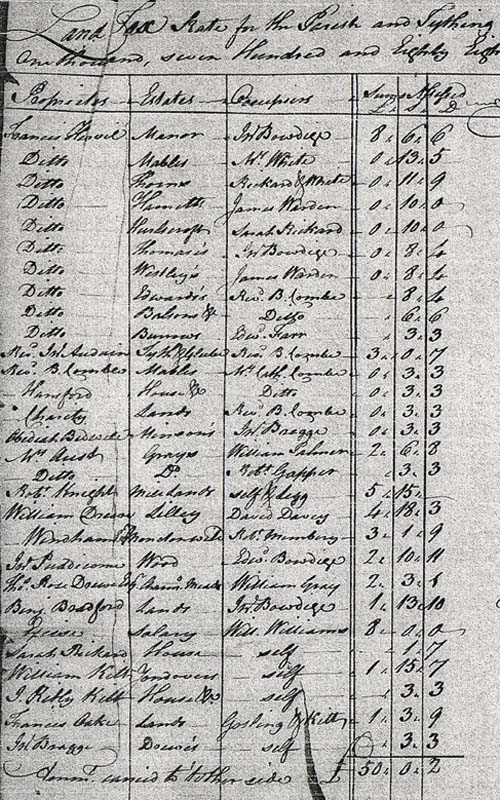 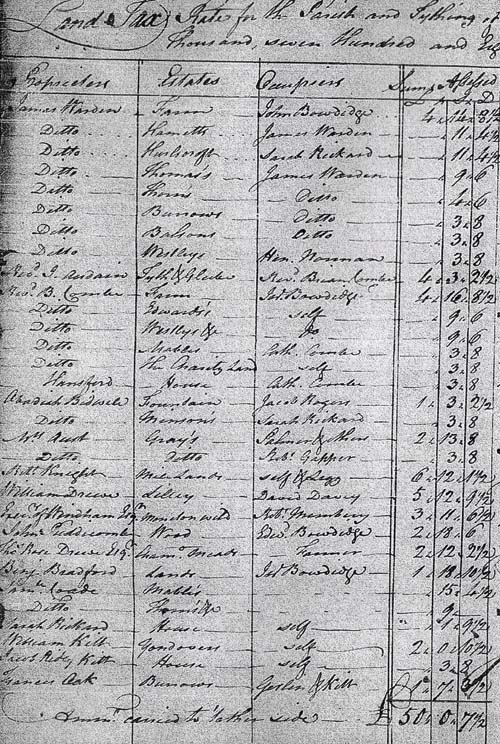 |
|||||||||||||||||||
| In 1788 The Henvill/ Ellesdon Manor of Charmouth Estate was finally sold to James Warden who sold part of it to the wealthy village Curate, Rev. Brian Coombe as is shown by comparison on Land Tax list for the following year. | |||||||||||||||||||
| Wm. Clapcott, Sheriff of Dorset. 1734 | |||||||||||||||||||
| Clapcot(t) |
|||||||||||||||||||
Greene v Ellesdon.Plaintiffs: Edmund Greene.Defendants: John Ellesdon, William Ellesdon and Anne Ellesdon his wife.Subject: money matters, Somerset. 1660 |
|||||||||||||||||||
Ellesdon v Salter.Plaintiffs: John Ellesdon and William Ellesdon.Defendants: Anthony Salter.Subject: property in Whitechurch, Dorset. 1657 |
|||||||||||||||||||
Ellesdon v Henley.Plaintiffs: William Ellesdon.Defendants: Robert Henley.Place or subject: money. 1661 |
|||||||||||||||||||
Hallett v Ellesdon.Plaintiffs: Hugh Hallett.Defendants: Anthony Ellesdon.Subject: money, Dorset.Document type: bill and plea. 1652 |
|||||||||||||||||||
Prideaux v Ellesdon.Plaintiffs: Sir Edmund Prideaux bart.Defendants: William Ellesdon and others.Place or subject: estate of Robert Moggaridge, Lyme Regis, Dorset.Document type: bill and answer. 1658 |
|||||||||||||||||||
Ellesdon v Butler.Plaintiffs: William Ellesdon.Defendants: Edward Butler.Subject: money matters.Document type: answer only. 1661 |
|||||||||||||||||||
Salter v Ellesdon.Document type: bill only.1661 |
|||||||||||||||||||
| Petition of William Ellesdon. [Copy of S.P. 29/304 no. 136]. 1672 | |||||||||||||||||||
Isaacson v Ellesdon.Document type: Bill only.Plaintiffs: James Isaacson, esq of Lambeth, Surrey.Defendants: Honor Ellesdon and John Ellesdon. 1719 |
|||||||||||||||||||
Collyer v Ellesdon.Plaintiffs: Arthur Collyer and Anne Collyer his wife.Defendants: Joan Ellesdon, widow and others.Place or subject: property in Mosterton, Dorset, Misterton Merriott, Somerset etc. 1695 |
|||||||||||||||||||
| CUSTOMS, &c.: COLLECTORS OF CUSTOMS AT SUNDRY OUT PORTS.: J. Ellesdon Lyme Regis. 1648 | |||||||||||||||||||
Isaacson v Ellesden.Document type: Bill and two answers.Plaintiffs: James Isaacson, esq of Lambeth, Surrey.Defendants: Honor Ellesdon, widow, John Ellesdon and Thomas Ellesdon. 1718 |
|||||||||||||||||||
Roberts v Henvill.Document type: Two bills and two answers.Plaintiffs: Mary Roberts, widow of Winterborn Abbots, Dorset (aunt and administratrix of Thomas Ellesdon, merchant deceased late of Lydd, Kent, deceased; vizt only son and heir of Honor Ellesdon, widow deceased late of Lydd, who was sister of your said oratrix).Defendants: Richard Henvill, merchant, Anthony Ellesdon, esq, Charles Henvill, Margaret Henvill, James Pellham and [unknown] Odiarne. 1732. |
|||||||||||||||||||
| Clapcott v Roberts.Plaintiffs: Sarah Clapcott.Defendants: Robert Roberts and Mary Roberts his wife, Hannah Clapcott, Barbara Clapcott, Alice Clapcott, John Ellesdon and Honor Ellesdon his wife.Subject: personal estate of Sarah Clapcott, Steepleton, Dorset.1685 | |||||||||||||||||||
56) House, in Church St. (formerly Ellesdons) (Rockett, Moor), 1718,1790 (57) House, in Church St. (Cole, Rockett), 1726-1757(59) House, in Church St. (Hallet), 1739 (formerly Ellesdons see DD\TOR 136 no. 9)(60) House, in Church St. (Peckett, Coade), 1715, 1746 (formerly Ellesdons, see DD\TOR 136 no.3) |
|||||||||||||||||||
Rose v Mayor of Lyme Regis.Plaintiffs: Elizabeth Rose widow, Joesph James and Francis Wells.Defendants: mayor and burgesses of Lyme Regis, Walter Tucker, William Smyth, Gregory Alford, Solomon Andrews and John Ellesdon.Subject: property in Plympton Erle, Devon.1664 |
|||||||||||||||||||
| List of births & deaths of seven children born to William and Joyce Henville between 1725 and 1738; extract from the P.C.C. Registry of the will of Sarah Henville (one of the children) of Furley, Netherbury, aunt of Elizabeth Carter, proved 1799. | |||||||||||||||||||
| Henvill v Durston 1783 | |||||||||||||||||||
.jpg) |
|||||||||||||||||||
 |
|||||||||||||||||||
Will of Anthony Ellesdon dated 1656. He was the father of William and John Ellesdon and also bought Newlands, Charmouth in 1649.
Anthony Ellesdon of Lyme Regis Gentleman, 1655, do make my will. My body buried in the Chancel at Lyme . My brother Thomas Ellesdon gift. I bequeath to my son, John Ellesdon and his heirs all my lands and leases in the parish of Lyme Regis and in default to my son, William Ellesdon and his heirs and then to my son Anthony Ellesdon. I give to my son JohnEllesdon all my tenements and leases within the parish of Whitchurch. I will that my said son William Ellesdon in respect of an estate granted by me unto him of certain lands and premisses lying in Huish in Somerset. Shall unto a bond of £800 unto Richard Rose Esq. and Robert Burridge, Merchant, for the use of my said son, Anthony Ellesdon for the payment of £400 in the hands of Amos Short. Said son John Ellesdon in respect of the lands and leases I gave unto him by this my will shall enter unto a bond of £600 unto the said Richard Rose and Thomas Burridge. To and for the life old my said son, Anthony Ellesdon for the payment of £300 unto the hands of Amos Short in trust. Also that the said son, Anthony Ellesdon shall not marry with Elizabeth Stephens, sister of Henry Stephens of Foy in the. Linty of Cornwall. Nor with any other woman without the consent of his brothers John and William Ellesdon. I bequeathe to my son, Anthony the said plate and linen which I had with my late wife, Mary, mother of my said son, Anthony. My daughter, Ann the wife of my son, William . All the rest of my goods I bequeathe tp my son, John Ellesdon whom I make my executor
|
|||||||||||||||||||
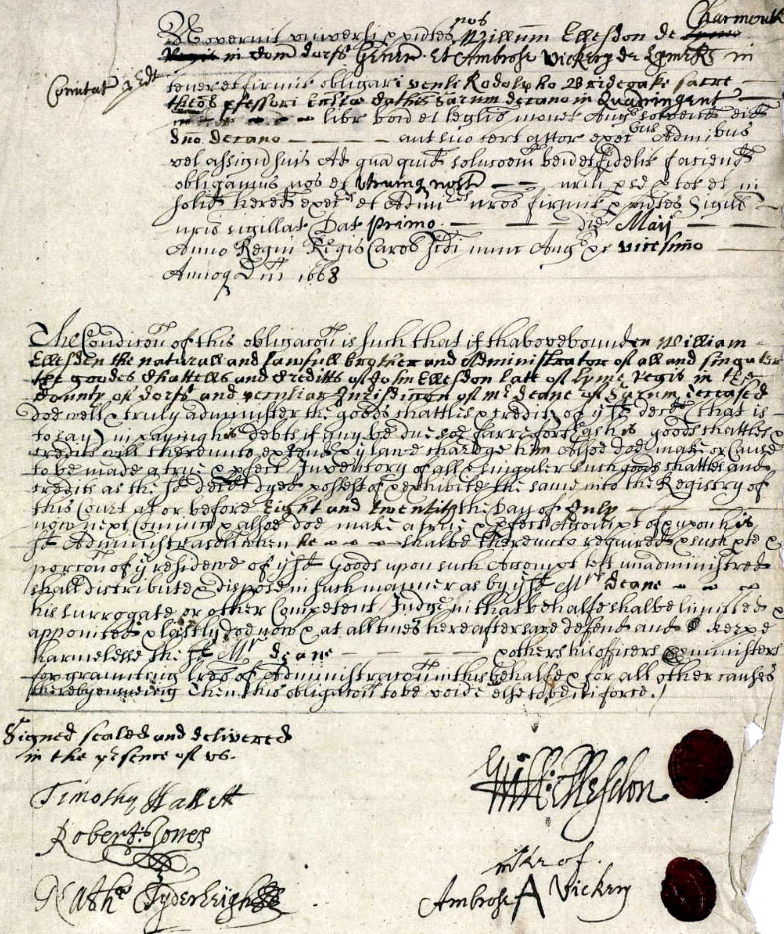 |
|||||||||||||||||||
| Will of John Ellesdon, brother of William Ellesdon, who was Mayor of Lyme Regis William Ellesdon of Charmouth 1668 William Ellesdon, the natural and lawful brother and administrator of all and singular goods and chattels of John Ellesdon late of Lyme Regis in the County of Dorset and ...of Mr Deane of Sarum, deceased. ... signs’s Timothy Hallett, Robert Jones, William Ellesdon, Ambrose Vickery Randolph Brideoake. |
|||||||||||||||||||
 |
|||||||||||||||||||
Be it known to all that Sarah Ellesdon, the Relict of John Ellesdon, late of Lyme Regis do herby relinquish all my right in the personal estate of my deceased husband and now devise the letters of administration mY be granted to his natural brother William Ellesdon, Gent. Signed Sarah Ellesdon 1668 |
|||||||||||||||||||
 |
|||||||||||||||||||
| The Henvill family still had links with Charmouth as can be seen by the entries in the Parish Regusters for Charmouth, whjen in 1814, the children of Richard and Mary Henvill from Netherbury are baptised at the Church by Brian Combe. | |||||||||||||||||||
 |
|||||||||||||||||||
| Mr. Thomas Ellesdon of Lydd in Kent married Mrs. Mary Henvill of Charmouth at Hawkchurch in 1726 | |||||||||||||||||||
| Brass Plate for Richard Henvill, Husband Of Margaret Henvill Of Looke in this county Litton Cheney | |||||||||||||||||||
| 1646 Henvill v. Henvill Abbotsbury, Dorset 1646 Inheritance Disputes Index, | |||||||||||||||||||
.jpg) |
|||||||||||||||||||
 |
|||||||||||||||||||
In the Church of Lytton Cheyney in Dorset |
|||||||||||||||||||
 |
|||||||||||||||||||
| A reference to a servant of Richard Henvill, Esq who worked for a year for him at Looke in the parish of Abbotsbury in Dorset before 1730 | |||||||||||||||||||
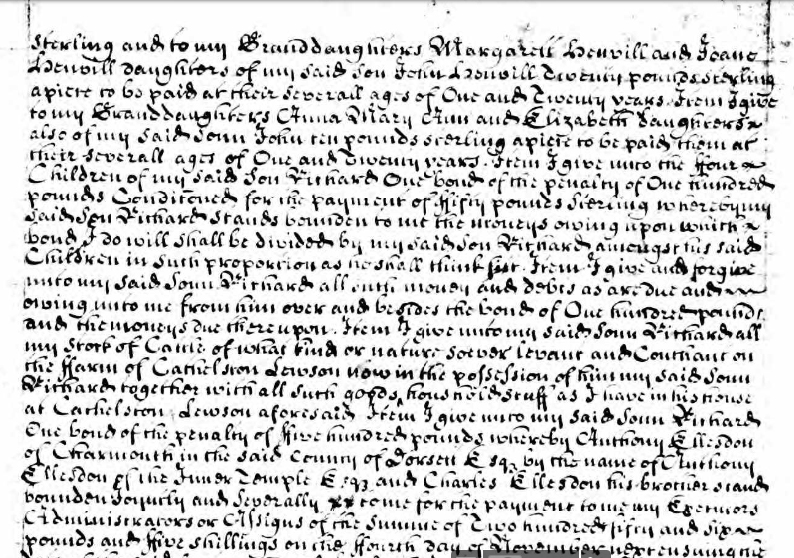 |
|||||||||||||||||||
| An abstract from the Will of Richard Henvill Will of 1692. He was father of Ricahrd who married Mary Ellesdon, daughter of William Ellesdon. I give to the church of Lytton poor - 40 shillings. Poor of Abbotsbury 20 shillings. Poor of Puncknoll - 20 shillings. I give to Margaret, my loving wife, the farm in Looke, where I now live. I give to her all household stuff and furniture within said messuage together with horses, hogs and poultry. At her death to be distributed between my two sons, John and Richard as she feels fit. I give to my said son Richard Henvill all my said messuage and farm at Looke and my Estate. I give to richard all my stock of cattle and implements at my farm at Looke and to pay £200 to my son John Henvill. I give to my wife the sum of £60 yearly rent. I give to the daughters of my son John the sum of £100. I give to my son, John, all my lands and tenements in Hinknoll in the parish of Netherbury and afterwards to my grandson, Richard Henvill, son of John. I give to my grandson the sum of £20 and to my granddaughter Margaret Henvill and Joane Henvill, daughters of my said John Henvill £20 to be laid when they are 21. I give to my granddaughters Anna, Mary, Ann and Elizabeth, daughters of John Henvill when they reach 21 the sum of £21 each. I give to the four children of my said son Richard one bond of £100. I give and forgive unto my son, Richard all such money and debts as are due and owing to me from him over and besides the £100 bond. I give unto my said son, Richard, all my stock of cattle on the farm at Catherston Lewson now in the possession of him together with all such goods, household stuff as I have in his house at Catherston Lesson aforesaid. I give to my said son Richard, one bond of the penalty of £500 whereby Anthony Ellesdon of Charmouth in the said County of Dorset Esq, by the name of Anthony Ellesdon of the Inner Temple, Esq, and Charles Ellesdon his brother stands bound jointly and separately to me for the payment to my executors the sum of £200. The said bond dated 1688 was given to me for securing part of my said son, Richards wives portion. My said son Richard shall have the whole benefit of the bond. I give to my daughter, Margaret Sampson, £100 which is part of the £300 which she doth owe upon a mortgage of the several messuage at Rydon and Lopen in Somerset. I give to my granddaughter Anna Sampson and Margaret Sampson £50 apiece and to my grandson George Sampson £40 and to my grandson, Richard Sampson £60; to be paid from the said mortgage. I give to my said son, John Henvill, whom I make my sole executor and my very good friends Sir Robert Napier of Pinknoll, John Harding of Long Bredy, and Arthur Payne of Allington overseers. Richard Henvill |
|||||||||||||||||||
| In 1676 Anthony Ellesdon was called to the Inner Temple in London. His address is given as Charmouth. He appears to have left in 1683 | |||||||||||||||||||
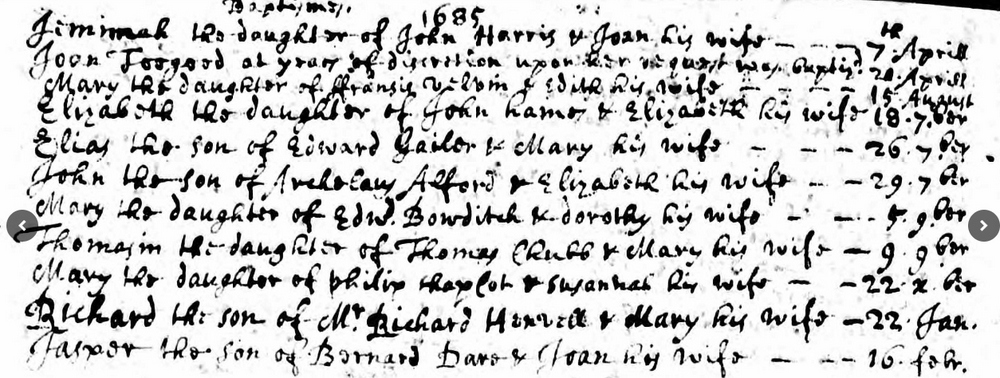 |
|||||||||||||||||||
| The parish records for Wootton Fitzpaine show Richard born to Mr. Richard and Mary Henvill on the 22nd January 1685. They were living at Catherston Manor, which was bought by his father in 1669 for £2000. In 1687, William was christened there, Anna in 1688, Mary in 1690, Margaret in 1693 | |||||||||||||||||||
| Richard Henvill, St. Michaels Ward Bistol Voters List 1734 | |||||||||||||||||||
.jpg) |
|||||||||||||||||||
| Richard Henvill of City of Bristol, Merchant gives his estate to his wife Benedicta and then to his daughter, Benedicta Henvill. | |||||||||||||||||||
 |
|||||||||||||||||||
An Act of the greater security of the Island of St. Christopher in case of Invasion in 1746 |
|||||||||||||||||||
| 1822 – July 4 – Under Licence, Francis Phipps Henville of Otlevy’s estate, widower, & Sarah Ann Kelly, spinster, eldest d. of Mrs. Mary Kelly of Basseterre, widow, of the late David Kelly, Esq., Attorney-at-Law. J. P. Bartrum, Rector | |||||||||||||||||||
 |
|||||||||||||||||||
|
|||||||||||||||||||
 |
|||||||||||||||||||
 |
|||||||||||||||||||
 |
|||||||||||||||||||
|
|||||||||||||||||||
 |
|||||||||||||||||||
| Constantine Phipps HENVILLE was born in 1807 at Chideock, Dorsetshire, England to Richard John HENVILLE & Mary SMITH. I have the HENVILLE pedigree going back to Matthew HENVILL born c1603 in the Dorsetshire area in England. | |||||||||||||||||||
Sandy Point is the second largest town in the island of Saint Kitts, Saint Kitts and Nevis. This town is situated on the north-west coast of St.Kitts and is the capital of Saint Anne Sandy Point Parish. It is strongly believed that the area known as Sandy Point was the original landing point for the English sea captain and explorer, Sir Thomas Warner, in 1623. After being founded in the 1620s, the town became the commercial centre of St. Kitts and was one of the busiest ports in the region, as evidenced by the remains of the many former Dutch warehouses lining the shoreline, which once totalled over 300. After 1727, when the bulk of commercial activity was moved to Basseterre, the town and its port slowly diminished in importance. In 1984, the port was closed entirely following the impact of Hurricane Klaus. Sandy Point has a population of 3,140. The greatest evidence of the town's former wealth can be seen in Brimstone Hill Fortress National Park. The largest fortress ever built in the Eastern Caribbean by the British, this fortress was constructed to defend the town's port and the downhill fortress of Fort Charles (Saint Kitts), which in turn was the colony's second largest fortification. |
|||||||||||||||||||
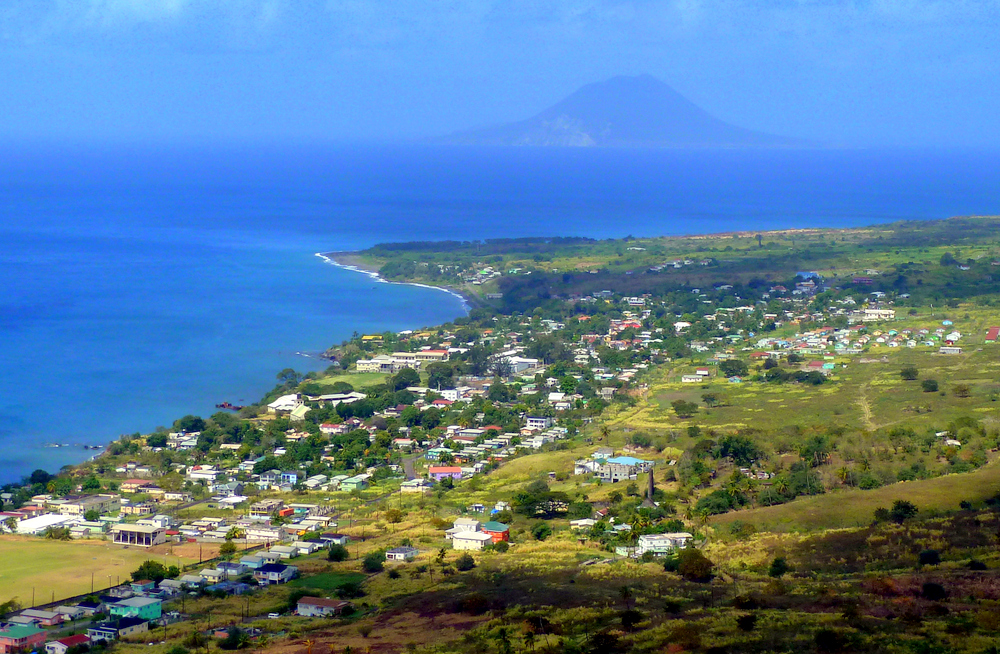 |
|||||||||||||||||||
Sandy Point, St. Kitts |
|||||||||||||||||||
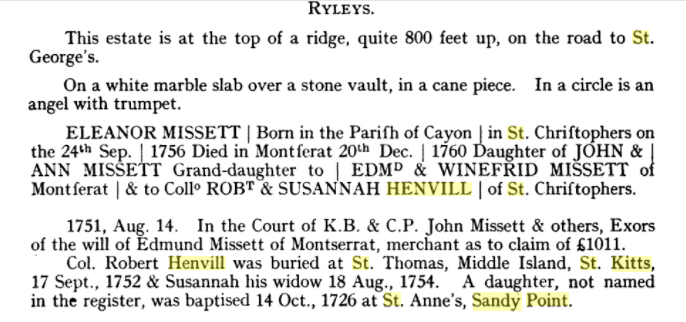 |
|||||||||||||||||||
|
|||||||||||||||||||
Saint Anne Sandy Point is a parish on the island of Saint Kitts (formerly St. Christopher).
|
|||||||||||||||||||
| History, gardens, adrenalin thrills and local crafts all come together on the Wingfield Estate, on the south-west coast of St. Kitts. Here you can walk around the monumental, partially restored ruins of the first working estate and rum distillery in the Caribbean, which was founded in 1625 and still includes remnants of a sugar mill and aqueduct. | |||||||||||||||||||
.jpg) |
|||||||||||||||||||
The fertile soil and tropical climate of the Caribbean made it an ideal place to grow many crops. Some crops that excelled in the Caribbean were sugar, coffee, cocoa, indigo, tobacco, and cotton. In order to grow these crops, it was necessary to have a dependent source of labor. This source of labor was African slaves. In order to receive slaves, those in the Caribbean would trade cash crops such as sugar, rum, wood and molasses in return for slaves. This became the Triangular Trade. Slaves were captured and brought to the coast of Africa, where they were traded to Europeans in return for arms and liquor. The slaves were then shipped to the Caribbean through the infamous Middle Passage. On average, 12% of the slaves never made it across the Atlantic. |
|||||||||||||||||||
| Sugarcane was the most prosperous crop grown in the Caribbean area. After 1700, Barbados, alone, was producing 8,000 tons of sugar a year. Using sugar mills known as trapiches or ingenios, sugarcane was pressed with heavy rollers to squeeze out all of the juice. Then the juice was boiled and clarified and placed into forms. While in these forms, the liquid crystallized into sugar. The by-product was drained from the crystals and used to make molasses and rum. These two products were also exported in return for other goods, such as slaves. The best sugar land was located on the coast, where barrels could be rolled to the beach and easily shipped. | |||||||||||||||||||
The plantation owners in the Caribbean began to acquire massive amounts of slaves from the Triangular Trade. Historians debate the exact number of slaves brought to the Americas through the Transatlantic Slave Trade. One estimate is that about 10.3 million Africans were imported to the Americas through this trade route. The British islands alone imported 1.5 million African slaves from the beginning of the plantation system until just before the American Revolution. In the late 18th century, the average slaveholding in the British islands was 240 slaves. In some parts of the Caribbean, the ratio of Africans to Europeans reached 25:1. The mortality rates of African slaves were very high due to the harsh conditions they faced on the plantations. Since the labor in the Caribbean consisted mostly of cultivation of crops, women were rarely acquired by plantation owners. This resulted in skewed sex ratios which made it nearly impossible for Africans to reproduce. With high mortality rates and skewed sex ratios, there was a constant need to import more slaves to continue the work on the plantations. |
|||||||||||||||||||
| t would seem for awhile that all three estates would be owned by the Henvill family. In the 1754 Poor Rates Richard Henvill Esq is shown as paying 4d for Mabells (Newlands). There are a number of references in the Parish records in the 17th and 18th centuries to the family who farmed the estate called Mabell, and there is a will in the Dorset Record Office to an Edward Mabell who died in 1699. He is also shown in 1664 paying Hearth Tax on his house with 3 chimneys, which may well have been the building now known as Stonebarrow Manor. But by 1783 all the Estates were sold by Francis Phipps Henvill to clear debts he had ammased. Cathertson was bought by William Drewe of New Inn, London, Charmouth by James Warden and the Rev. Brian Coombes. |
|||||||||||||||||||
| 6th September 1783 - Attested copy of Indenture of release between Francis Phipps Henvill, then late of the island of St Christopher in the West Indies, But then residing at Charmouth in the County of Dorset, cousin and heir at Law of Benedicta Durston, late of Charmouth, aforesaid widow, formerly Benedicta Henvill, deceased of the one part and Mary Hoskins of Bristol in the county of Somerset, widow and relict of James Hoskins, late of Long Ashton in the county of Somerset, esq., deceased, James Ireland of Brislington in Somerset, Esq. and Willliam Blake of the City of Bristol aforesaid. Merchant (trustees named in the last Will and Testament of the said James Haskins deceased of the other part whereby the said Francis Phipps Henvill granted and conveyed the said Manor, herediaments and premises to the said Mary Hoskins James Ireland and William Blake and their heirs by way of Mortgage for securing £1,200 and lawful interest. 13th November 1783 Attested copy of Indenture between said parties whereby said Francis Phipps Henvill charged said premises with the further sum of £300 and lawful interest making together the sum of £1500. 15th November 1783 Attested Copy of Bargain and sale involved in the Court of Common Pleas at Westminster between said Francis Phipps Henvill and Mary his wife of the one part and Baruch Fox the elder of Beaminster in the County of Dorset, gentleman and John James Millard of the City of Bristol, Cooper with of the other part whereby said Francis Phipps Henvill granted and conveyed said Manor, Heridiaments and premises to said Fox and Maitland and their heirs interest for sale . 3rd June 1788 Attested Copy of Indenture of Release being of 5 parts made between said James Ireland and William Blake Surviving Trustees named in the last will and Testament of the said James Hoskins, deceased of the first part said Baruch Fox and John James Millard of the second part, William Durston of Mark in Somerset, gentleman the residuary devises of the last Will and Testament of Benedicta Durston, late of Charmouth, widow, deceased of the third part the said James Warden of the fourth part and John Harvey Pearce of the fifth part whereby the said James Ireland and William Blake Baruth Ffox John James Millard and William Durston. Granted and conveyed said Manor and premises to said James Warden and John Harvey Pearse and the heirs and assigns of the said James Warden forever and as to the Estate of the said John Harvey Pearse Interest for said James Warden, his heirs and Assigns. .... 1788 Indenture.. And release between said James Warden and John Harvey Pearce of the one part and said Brian Combe of the other part whereby said John Harvey Pearce at the request and by the direction of the said James Warden did alienate and confirm and said James Warden did grant and confirm the said premises before particularly mentioned and hereby conveyed with their appurtenances unto the use of the said Brian Combe, his heirs and assigns forever. |
|||||||||||||||||||
| Details of the Manor of Charmouth in 1783 from a Map, the original was in the hands of Mr Puddicombe of Branscombe, who at one time owned Wood Farm From a book in the possession of Mr Wilkinson and bound in Vellum with the word CHARMOUTH on the Cover opposite the title page in very much faded words : the original is in the hands of Mr. Puddicombe of Branscombe. Index to the map of Charmouth Manor and Newlands Farm in the Parish of Whitchurch Canonicorum in the County of Dorset.The property of Francis Phipps Henvill Esq. By James Upjohn of Shaftesbury 1783 |
|||||||||||||||||||
| t is Brian who follows in his father`s footsteps and becomes Rector of Catherston on his father’s death in 1782. He should have also been Rector of Charmouth, but the Patron at that time was Francis Phipps Henvill who lived in St. Kitts and instead appointed his kinsman, John Audain to this position. But Audain soon tired of the village and returned to the West Indies leaving his Curate, Brian Coombe in charge. Brian`s father left him a fortune and he became the largest landowner in the village by purchasing Backlands Farm, Stonebarrow Farm, “Streets” and many other properties. He never married and lived with his mother, Catherine who died in 1814. |
|||||||||||||||||||
Gregory Alford said that Ellesdon was “newly married to a rich, but rigid Presbyterian “, a woman named Anne, and that his older brother, John, who would be the Mayor of Lyme Regis in 1659, was a violent Oliverian”. He went on to accuse Ellesdon. Of being more interested in the reward than in helping the King. He also claimed that Stephen Limbry failed to arrive at Charmouth rendezvous because of an argument over money, which Ellesdon refused to pay him. The truth of this is impossible to disentangle from Gregory Alfords later and very visible loathing for Ellesdon, which included a series of savage public attacks on Ellesdon for his non conformist religious beliefs. |
|||||||||||||||||||
| In 1710 John Burridge Junior Had his ship Martha joined company with The Anne of Bristol, a Brigantine commanded by Samuel King for mercahnt Richard Henvill and the sloop Mary both also bound for Guinea for slaves. French privateers swooped down on them and were lost. It was a severe financial and personal blow to John Burridge. In 1713 he transferred his tarde from London to Lyme Regis. The Burridges were rthe most considerable tarders in that port. | |||||||||||||||||||
| William Pinney, MP for Lyme from 1832, came from the Pinney family of West Dorset who had been involved with the West Indies, sugar production and slavery from the 17th century. The family received more than thirty thousand pounds in compensation when slavery was abolished in 1834. The freed slaves did not receive any compensation at all. | |||||||||||||||||||
Page from the Charmouth Parish Register, showing that ‘Romeo Hamilton an African’ was baptised there on 28th September 1800. He may have been an adult as no parents are mentioned. We cannot trace him in local records, suggesting that he was either a visitor or the servant of a visitor. |
|||||||||||||||||||
Reference: Dorset Natural History and Archaeological Society Volume 127, 2005, |
|||||||||||||||||||
William Elsdon Offices Held Biography Hutchins, Dorset, ii. 47, 71, 74, 78; Roberts thesis; Lyme Regis, fugitive pieces, mayors accts.; CSP Dom. 1595-7, p. 210; G. Roberts, Hist. Lyme Regis and Charmouth, 308, 382; PCC 17 Streat, 31 Kidd; G. Wanklyn, Lyme Leaflets, 63; G. Roberts, Soc. Hist. of Southern Counties, 71. Ref Volumes: 1558-1603 |
|||||||||||||||||||
| 27th October 1656 Attested Copy of Indenture of Release whereby William Ellesdon in consideration of a marriage between him and his wife released and conveyed the Manor and Adowson of Charmouth to Roger Gale, Walter West and Anias Short at by way of settlement | |||||||||||||||||||
| His great-grandchild alienated it to Sir John Jefferey of Hampton, whose posterity enjoyed it in the reign James I. and were patrons here about 1618. 1645, John Jeffery, esq. a captain in the King's army, had his farm here | |||||||||||||||||||
| 1544 Anne Elsdon - Thomas (Father).1550 Maudlin Elsdon - William (Father).1555 Mary Elsdon - William (Father).1557 Elizabeth Elsdon - William (Father).1558 Charles Elsdon - William (Father).1560 Elizabeth Elsdon - William (Father).1562 Thomas Elsdon - William (Father).1565 William Elsdon - William (Father).1566 John Elsdon - William (Father). | |||||||||||||||||||
| 1654 Anthony Ellesdon - William (Father). | |||||||||||||||||||
| 1581 Joan Elsdon Will. 1592 Nicholas Elsdon Will 1562 Thomas Elsdon Will | |||||||||||||||||||
George Elsden b.c.1530b. c.1530, yr. s. of Thomas Elsden of Lyme Regis by Joan, 3rd da. of William Bond of London and Lutton, Dorset; bro. of William ?m. 1s. 3da. |
|||||||||||||||||||
Elsdon v Elsdon.1558-1603 |
|||||||||||||||||||
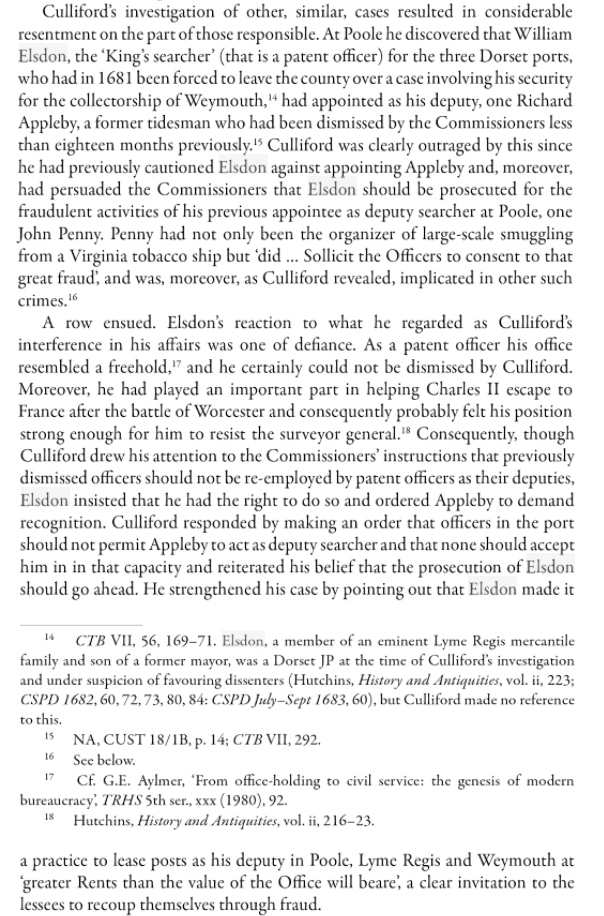 |
|||||||||||||||||||
The Seventeenth-Century Customs Service Surveyed: William Culliford's Investigation of the Western Ports, 1682-84 Hardcover – 28 May 2012 |
|||||||||||||||||||
Members of Parliament among the Ellesdons:1572 William Ellesdon,1573 William Ellesdon and George Ellesdon,1597 Christopher Ellisdon. |
|||||||||||||||||||
 |
|||||||||||||||||||
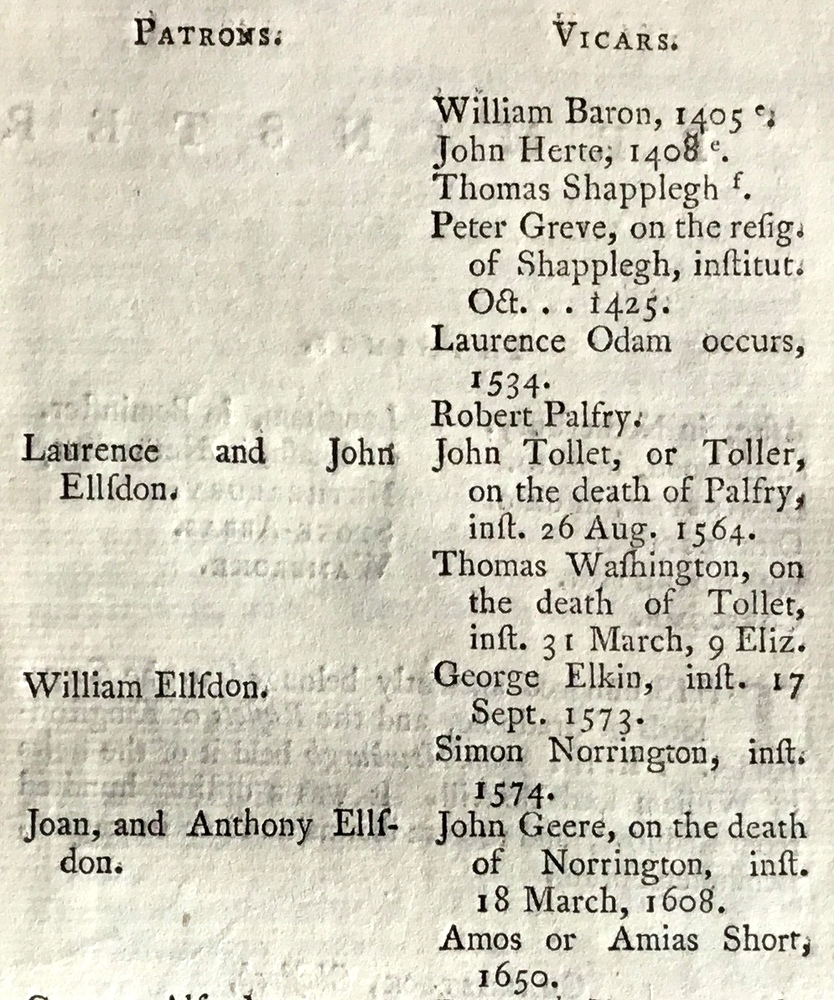 |
|||||||||||||||||||
LETTER OF MR WILLIAM ELLEDSON TO THE EARL OF CLARENDON. |
|||||||||||||||||||
Humbly conceiving that a compleat and perfect narration of the many and great dangers, and the as many and signal deliverances which his sacred majesty met withal after that fatal rout at Worcester, until his majesty's happy arrival at the port of safety which Almighty God, his gracious and merciful preserver, had designed for him, cannot but be very acceptable to all good Christians and loyal hearts, as being a work so much conducing to the glory of God, and the honour and renown of our most dread sovereign, and withal observing too great a defectiveness in those narratives on the subject that I have hitherto seen, as to some of those eminent deliverances which God was pleased mercifully to vouchsafe his majesty in the west ; to the intent that, if God shall stir up the heart of any learned and able historian to give a full and true account of those remarkable passages of Providence to the world, I may contribute my mite to such a noble and desirable undertaking ; I have now (upon presumption of your lordship's favourable acceptance) taken upon me the boldness to present unto your lordship a brief account of those memorable passages in this kind, which myself (as having been agent in them) had the honour and the happiness to be acquainted with ; the which your lordship may be pleased to take as followeth. After that his majesty was disappointed of his hopes of embarking at Bristol (of which your lordship may inform yourself in that account which a person of quality hath given the world, in his book stiled The History of his Sacred Majesty Charles the Second, printed at London, anno 1660, page 125), his majesty desired to be brought some miles westward, to the house of a worthy gentleman, whom he knew to be a trusty friend ; and accordingly, his majesty being conveyed to the house of Colonel Francis Wyndham of Trent, in Somerset, advice was had about preparation of passage for his majesty in some western port. In prosecution of which, myself being looked upon as person that might be confided in, and in a capacity of serving his majesty in order to his transportation (having not long before been instrumental in getting safe passage for Sir John, now Lord Berkeley), upon or about the 18th of September 1651, the aforesaid honourable and truly loyal gentleman, Colonel Francis Wyndham, came to me at my house at Lyme (where I then lived, looking upon it as some protection to me in those times to live in that town), when, after some other discourse had, and an engagement to secresy passed betwixt us, he told me that the king had sent him to me, commanding me to procure him a vessel in order to his transportation into some part of France. Being overjoyed to hear that my sovereign was so near me (as the colonel had informed me he was), and even ravished with content that an opportunity of expressing the loyalty of my heart to his most excellent majesty, so unexpectedly presented itself, I answered that I would with the utmost hazard of my person, and whatsoever else was dear unto me (as knowing myself by all obligations, both sacred and civil, thereunto obliged), strenuously endeavour the execution of his majesty's both just and reasonable commands in this particular ; being verily persuaded, that either God would preserve me from, or else support me in and under any sufferings for so good a cause. Accordingly, I immediately sent one to the custom-house to make enquiry who had entered his vessel as bound for France. News was brought me that one Stephen Limbry of Charmouth had lately entered his bark, and intended a speedy voyage for St Malo. Not only myself, but also Colonel Wyndham was much affected with these tidings; I having told him that I had an interest in the master (he being my tenant), and that he had ever the repute of being well affected to his majesty. Upon these encouragements, we (resolving to lose no time) rode to Charmouth by the seaside, to confer with the master, which way I the rather made choice of, that in our passage there I might show the colonel what place I judged most convenient for his majesty to take boat in (in case we could work the master to a compliance), in order to his embarking; and, indeed, a more commodious place for such a design could hardly be found, it lying upon the shore a quarter of a mile from any house, and from any horse or footpath. The colonel being fully satisfied of the conveniency of the place, we rode into the town, and immediately sent for the master, who being very happily at home, presently repaired to us at the inn. Friendly salutations and some endearing compliments being premised (and a name that was nothis own being by me, in the hearing of the master, given to the colonel, in the way of disguise), I told him that the end of our sending for him was to procure passage for a friend of mine and this gentleman's, who had a finger in the pye at Worcester. The man being startled at this proposition (as apprehending more than ordinary danger in such an undertaking), we were necessitated to use many arguments for the removal of his fears, which we so happily managed, that in a little time we saw the effect of them by his chearful undertaking the business. Wherefore, an ample reward being engaged for on our part, he promised speedily to prepare his vessel, and hale her out of the cob the Monday following, and about midnight to send his boat to the place appointed for the taking in of the passenger, and then immediately to put off to sea (in case the winds were favourable). Thus far we were agreed ; and in all our discourse, there was no enquiry made by the master, nor any the least intimation given by us, who this passenger might be, whose quality we purposely concealed, lest the hopes of gaining £1000 (the promised reward of the highest treason) might prove a temptation too strong for the master to grapple with. Having thus far successfully proceeded in our business, we returned to Lyme. And the next day returning to his house at Trent with these hopeful tidings to his majesty. I bore him company part of his journey, and chose the land road from Lyme to Charmouth, that upon the top of a hill, situate in our way betwixt these two towns, upon a second view he might be the more perfectly acquainted with the way that leads from Charmouth to the place appointed for his majesty's taking boat ; it being judged most convenient, upon several accounts, that the colonel, and not myself, should be his majesty's conductor thither. Here calling to mind that on Monday (the day appointed for his majesty's embarking) a fair was to be held at Lyme, and withal doubting lest upon that account (through the nearness of the place), our inn in Charmouth might be filled with other guests, we sent down one Harry Peters, then a servant of the colonel's (who yet was not with us the day before), with instructions, by an earnest of five shillings to secure the two best rooms in the inn against his majesty's coming ; who told the hostess (to take off suspicion) this fair tale : That there was a young man to come thither the next Monday, that had stolen a gentlewoman to marry her, and (fearing lest they should be followed and hindered) that he desired to have the house and stables at liberty to depart at whatsoever hour of the night he should think fittest. This message being performed, the rooms made sure of, and the servant returned, I then showed the colonel a country house of my father's, distant both from Lyme and Charmouth about a mile and a half, which (for the privacy of it) we determined should be the place whither his majesty, with the Lord Wilmot, who then waited upon him, should repair on Monday next, that I might then and there give his majesty a farther account of what had passed in the interim between myself and the master. And now being abundantly satisfied and exhilarated in the review of the happy progress we had thus far made, with most affectionate embraces the noble colonel and myself parted ; he returning to his house to wait upon his majesty, and myself towards mine, vigorously to prosecute what yet remained on my part to be done with the master, in order to the compleating of this work thus happily begun ; in the performance of which, that I might approve myself faithful, I the same day, and the day following, and also on the Monday after, having diligently sought out the master, moved and pressed him so earnestly to the punctual performance of his passed promise, that he seemed discontented at my importunity, as betraying in me a suspicion of his fidelity. A little to allay his passion, I told him I was assured that the gentleman, my friend, would be at Charmouth on Monday, and that if he were not ready to transport him, it might prove an undoing both to my friend and me. Whereupon, to vindicate himself, he told me that he had taken in his ballast, that he had victualled himself, and haled out his vessel to the cob's mouth, for fear of being beneaped, because the tides at that time were at the lowest. Being well satisfied with this answer, I left him (after that I had given him instructions how to prevent any jealousies that might arise in the breasts of the mariners concerning the persons to be transported), and immediately went to the aforesaid country house of my father's, whither when I was come (and perceived that I was the first comer), that I might also erect a blind before the tenant's eyes, I demanded of him whither the London carrier had passed that day or not ; telling him, withal, that I expected two or three friends, who promised to meet me there about the time of the carrier's passing that way. His answer to me was but little to the purpose ; but in half an hour after my arrival there, came the king, with Mrs Julian Coningsby, a kinswoman of the colonel's, who rode behind him, the Lord Wilmot, Colonel Wyndham, and his man Peters, attending on him. After their coming in, I took the first opportunity to acquaint his majesty with what had passed betwixt myself and the master after Colonel Wyndham's departure from me. The result of all which was this, that the master had assured me that all things were in a readiness for the intended voyage, and that (according to the instructions given him) he had possessed the seamen with a belief that one of the passengers viz. my Lord Wilmot was a merchant, by name Mr Payne ; and the other, meaning the king, was his servant. That the reason of Mr Payne's taking ship at Charmouth at such an unseasonable hour, and not at Lyme, was because that, being a town corporate, he feared an arrest, his factor in St Malo having broken him in his estate by his unfaithfulness to him ; and that therefore he was necessitated with this his servant speedily and privately to transport himself to St Malo aforesaid, in order to the recovery of such goods of his as by his said factor were detained from him ; the sending of which goods at several times this servant of his could sufficiently testify and prove. This I then rather acquainted his majesty and the Lord Wilmot with, that after their being shipped (the more to confirm the mariners), they might drop some discourses to this effect. His majesty having showed his approbation of what I had done, was graciously pleased, as a testimony of his royal favour (which I have ever esteemed as a jewel of greatest worth), to bestow upon me a piece of gold, telling me that at present he had nothing to bestow upon me but that small piece ; but that, if it ever should please God to restore him to his kingdoms, he would readily grant me whatsoever favour I might in reason petition him for. Upon this his majesty, attended as is before expressed, rode towards Charmouth, commanding me to hasten to Lyme, and there to continue my care that all things might be performed according to his majesty's expectations and the master's promise. Accordingly, I made haste home, found out the master, acquainted him that my friend was now at Charmouth, and that I newly came from him. He replied, that he was glad of it, that he would presently repair to Charmouth to speak with him, and to tell him when he would come ashore for him ; which accordingly he did. And thus far all things succeeded according to our best wishes, both the wind and tide seeming to be at strife which of them should most comply with our desires. But after all these fair hopes, and the great likelihood we had all conceived of his majesty's happy transportation, it pleased God Almighty, for the clearer manifestation of his infinitely glorious wisdom and powerful goodness in his majesty's preservation, suddenly to blast this design, and to cast his majesty upon new streights and dangers. For the master, either through weakness of judgment, or else in design to prevent a discovery, had utterly forborne to acquaint his wife with his intentions to go to sea, until it was almost time for him to go aboard. Whereupon he no sooner called for his chest, but his wife asked him why he would go to sea having no goods aboard. The master now thought himself necessitated to tell her Mr Ellesdon had provided him a fraught, which would be much more worth to him than if his ship were full loaden with goods, he being to transport a gentleman, a friend of his. His wife (having been at Lyme fair that day, and having heard the proclamation read, wherein £1000 was promised as a reward for the discovery of the king, and in which the danger of those also was represented that should conceal his majesty, or any of those that were engaged with him at Worcester, and apprehending that this gentleman might be one of the party) forthwith locked the doors upon him, and, by the help of her two daughters, kept him in by force, telling him that she and her children would not be undone for ever a landlord of them all ; and threatened him that, if he did but offer to stir out of doors, she would instantly go to Lyme, and give information both against him and his landlord to Captain Macy, who had then the command of a foot company there. Here the master showed his wisdom not a little by his peaceable behaviour ; for had he striven in the least, it is more than probable his majesty and his attendants had been suddenly seized upon in the inn. But I must needs awhile leave the master a prisoner in his own house, his wife and daughters being now become his keepers, whilst I render an account of the actings of Colonel Wyndham, who, with his man Peters, at the time appointed, went to the place agreed upon to expect the landing of the boat ; but no boat coming, after several hours waiting (because he saw the tide was spent), he resolves upon returning to the inn. In his way thither he discovers a man coming towards him, dogged at a small distance by two or three women. This, indeed, was the master of the vessel, who by this time had obtained liberty (yet still under the eyes of his over-jealous keepers) to walk towards the seaside, with an intention to make known to those that waited there for him the sad tidings of this unexpected disappointment, together with its causes. The colonel (when they met), though he conceived it might be the master, yet, being not certain of it, and seeing the women at his heels, passed him by without enquiring into the non-performance of his promise. Your lordship may easily guess that this frustration of hopes was matter of trouble as well as admiration to his majesty. The issue of it was that Peters, very early the Tuesday morning, was sent unto me to know the reason of it. He had no sooner delivered his message, but astonishment seized on me ; and the foresight of those sad consequences which I feared might be the fruits of this disaster, wrought in me such disquietment of mind, that (for the time) I think I scarcely sustained the like upon any occasion in all my life before, my confidence of his majesty's safe departure adding not a little to the weight of that load of sorrow, which afterwards lay so heavy upon me. The cause I plainly told him I was wholly ignorant of, except this were it, that in regard it was fair-day the master might not be able effectually to command his mariners out of the alehouses to their work, but promised speedily to search into it ; and upon after enquiry, I found it to be what I have before related. But here (because I apprehended that delays might prove inauspicious) I presently dismissed the messenger with this my humble advice to his majesty, that his longer stay in Charmouth might endanger his discovery ; which had certainly proved the issue of it, had not God, the King of kings, graciously, and even miraculously, prevented it. For the hostess of the house, little thinking what manner of guests the chambers before spoken of had been secured for, had at that time admitted to be her ostler one of Captain Macy's soldiers, a notorious knave ; who observing and taking notice that the colonel and his man went out so late at night towards the seaside, and that the rest of the company, during their absence, were more private than travellers are wont to be, and perhaps inspired and prompted by the devil, strongly suspected one of these guests to be the king, under the disguise of a woman's habit, and ceased not once and again to discover his jealousies unto his mistress. But she (though, from the fellow's words, and the consideration of some circumstances which that night and some days before had occurred, she had some thoughts that it might be so, yet) detesting as much to lodge treason in her heart, as she would have been proud of entertaining the king in her house, very passionately rebuked the ostler for these insolencies, hoping by that means to put a stop to his (as she judged) treasonable projects. Yet this her honest design wrought not the intended effect upon the heart of this her treacherous servant ; for the same morning, whilst Peters was with me at Lyme, he went to speak with the then Parson of Charmouth, intending to communicate his suspicions to him ; but found no opportunity to speak with him, he being at that time engaged in prayer with his family. Another remarkable passage we must of necessity here insert, which was this : My Lord Wilmot's horse wanting a shoe, in Peters's absence, the ostler led him to one Hammet's, a smith, then living in Charmouth, who, viewing the remaining shoes, said : " This horse hath but three shoes on, and they were set in three several counties, and one of them in Worcestershire ; " which speech of his fully confirmed the ostler in his former opinion. By this time Harry Peters, being returned from Lyme, and my Lord Wilmot's horse shod, upon the advertisement that was sent him, his majesty immediately departed towards Bridport, a town eastward of Charmouth, and about five miles distant from it. The ostler, now that the birds had taken their flight, began to spread his net. For going a second time to the parson, he fully discovered his thoughts to him, and withal told him what the smith had said concerning my Lord Wilmot's horse. The parson thereupon hastens to the inn, and salutes the hostess in this manner : " Why how now, Margaret you are a maid of honour now." " What mean you by that, Mr Parson quoth she. Said he, "Why Charles Stuart lay last night at your house, and kissed you at his departure ; so that now you can't but be a maid of honour." The woman began then to be very angry, and told him he was a scurvy- conditioned man to go about to bring her and her house into trouble. "But," said she, "if I thought it was the king, as you say it was, I would think the better of my lips all the days of my life ; and so, Mr Parson, get you out of my house, or else I'll get those shall kick you out." I have presented this discourse in the interlocutor's own words, by this means to make it more pleasant to your lordship. But, to return to the main intendment of this my narrative, I shall (before we come in our thoughts to attend his majesty in his journey eastwards) humbly beg of your lordship this favour, that your lordship would here be pleased seriously to admire with myself the goodness of Almighty God in infatuating this ostler, and the rest of his majesty's enemies in these parts. First of all, the parson (being not a little nettled at the rude and sharp language the hostess gave him), taking Hammet the smith along with him, he speedily applied himself to the next justice of the peace, to inform him of the fore mentioned jealousies, together with the reasons of them ; and earnestly pressed him to raise the county by his warrants, in order to his majesty's apprehension. But he (as God was pleased to order it), thinking it very unlikely that the king should be in these parts, notwithstanding all the parson's bawling and the strong probabilities upon which their conjectures seemed to be grounded, utterly rejected his council, fearing lest he should make himself ridiculous to all the country by such an undertaking. As for the ostler, his imprudent managing his mischievous intention discovered itself two ways ; first, in his having recourse to the parson ; whereas, with greater likelihood of success, he might have taken the advice and assistance of his fellow-soldiers, three whereof, being very desperate enemies to his majesty, were at that time inhabitants of Charmouth, and his nearest neighbours. In the next place, his egregious folly was further manifested in his delaying to acquaint his captain at Lyme with his suspicions abovenamed until twelve of the clock that day ; for had it not been for this neglect of his, his majesty's escape would have been (in reason's eye) impossible ; his captain, Macy, having no sooner received the report of these surmises, and information on what horses and in what equipage, and which way the persons suspected made their departure from Charmouth, but, having (in all likelihood) the promised reward of such mischievous diligence in his eye, he instantly resolves to leave no means unattempted, that with the least shadow of probability might conduce to his majesty's attachment. In pursuance of which resolves he presently mounts, and setting spurs to his horse, in a full career he rides towards Bridport, where, at his arrival, after a little enquiry made, he was given to understand that some persons, with whom the description he had received most exactly suited, had dined at the George that day, but not long before his coming were departed towards Dorchester. This, therefore, was the next place to which he posted (the wings of covetousness and ambition more nimbly transporting his mind than it was possible his horse could convey his body) ; which he no sooner entered, but (as if he had been to execute some warrant for the apprehending the most notorious felon in the kingdom, with the utmost haste and diligence imaginable, he searched all the inns and alehouses in the town. But God (who had given him no commission to violate majesty) was graciously pleased to make this furious hunter to overrun the game he hunted for. Wherefore dismissing him from creating any further trouble to your lordship (whose principles, I doubt, rather led him to the height of discontent at his supposed loss, than to a Christian observance of that divine hand of Providence which was so eminently seen in the preservation of that royal personage which he intended to make a prey of), let us now again return to his majesty : Who, in his passage from Charmouth, meeting with no interruption in his journey, soon reached Bridport ; and turning in at the George, he (to the astonishment, doubtless, both of himself and his attendants) found himself surrounded by his enemies ; there being at that time in the said town divers foot companies drawn together, who were designed for an expedition against Jersey. But being as yet unsuspected (lest he might too late bewail the sad effects of delay), after a short repast (too short, indeed, at any time but this, for so great and heroical a prince), his majesty left this town, going on the way that leads to Dorchester ; in which he had not rode past half a mile, ere by the finger of divine Providence he was directed into a narrow lane on the left hand of Dorchester road, by which means (though they knew not whither they went) they were that evening safely conducted to Broadwindsor, a country parish some six miles north of Bridport. They very fortunately lighted upon an inn where both the inn-holder and his wife were very well known to Colonel Wyndham, they having formerly been servants unto some of his allies. The colonel being confident he had an interest in them, upon the account of his former knowledge of them, and the relation they sometimes had to some of his kindred, persons of no mean quality, requested that he and his company might that night be lodged in the most convenient rooms for privacy their house would afford ; telling them, that himself and his brother, Colonel Bullen Reymes (meaning my Lord Wilmot, who very much resembled him), had transgressed their limits, the royalists at that time being confined within five miles distance from their homes. This they readily condescended to ; and thereupon led them into the uppermost chambers in their house. Yet here the face of danger was again discovered unto them ; for they had not been housed much above an hour before a company of troopers (to the number of forty) came thither, with an intention to quarter in this and other houses adjacent ; which accident might in all likelihood have proved fatal to his majesty (the soldiers everywhere about that time being proudly inquisitive into the names, qualities, affairs, and businesses of strangers), had not God in his infinite mercy incapacitated them for such like actings here, by cutting out work of another nature for them. For having a woman in their company, who not long after their coming thither fell in travail, and was delivered of a child, the officers and other inhabitants of the said parish, having notice thereof, contested so long with them about freeing their parish from the burthen of its maintenance, till sleep and drowsiness had rendered their heads unfit for anything but their pillows ; upon which, whilst they securely slept, his majesty, together with his attendants, arising some hours before day, and taking the opportunity of that time of silence, retired themselves undiscovered unto Trent. Where after his majesty had concealed himself about a week, he departed thence to one Mrs Hyde's, near Salisbury. What afterwards passed,must needs leave to others that had the honour to know it, being myself unable to spin the thread of this history any longer. Thus have I (right honourable), without the least violation of truth's chastity, made a brief collection of those never-to-be-forgotten miracles of Providence, wrought by the hand of Omnipotency for the conservation of his most serene majesty in the midst of the many perils he was exposed to in the west of Dorset, which came within my cognisance, which I humbly lay (such as it is) at your lordship's feet, being thereunto prompted upon the following considerations : First, that I might present your honour with some new matter for your meditations, having frequently observed your lordship to be much delighted both in moving, and also in hearing, discourses upon this subject. Secondly, that your lordship, by recounting in the hearing of others these Dei Magnalia, may quicken and excite them to a serious minding and due improvement of the infinite wisdom, power, and goodness of the most high God (the great preserver even of kings), manifested in what hath been the subject-matter of the precedent narrative. Lastly, that I might leave in your honour's hands some monument of my real gratitude for the many favours your lordship has been pleased to confer on me. But it is time for me to remember what the poet said to his Augustus : " In publica commoda peccem, Si longo sermoiie morer tua tempora." Lest, therefore, I should offend through my unseasonable prolixity, having first, with all submission, craved your lordship's pardon for this my great presumption in tendering to your lordship, whom the world justly esteems so absolute a master of speech, such a rude and unpolished story, I shall only beg the honour to subscribe myself, |
|||||||||||||||||||
 |
|||||||||||||||||||
List of Arrears due to the people listed instrumental in the Kings escape. William and his two sons, Anthony and Charles were owed £675, which equates to £100. William died in 1685, but the sons were still receiving a pension to atleast 1703. |
|||||||||||||||||||
Members of the Ellesdon family were Mayors of Lyme Regis seven times between 1521 and 1651, in which year Anthony Ellesdon held the office. In the ancient and interesting church of Lyme Regis is a brass in memory of four of them with the family arms and the lines : — "Men pious just & wise, each many a yeere The helme of this towne's government did steere Beyond base envious reach, whose endless name Lives in all those that emulate theire fame." William Ellesdon, who subsequently furnished Lord Clarendon with the detailed account of his share in the events of September 22-3, 1651, had two sons, Anthony and Charles (the latter, born on June, 1661, named after the King). Anthony Ellesdon lived till 13 November, 1737, having survived his brother Charles thirty-two years. There is a monument to him in the new church at Charmouth, removed thither from the older building. His mother and wife as well as his brother Charles were buried in the same vault with Anthony. Richard Alford was on five occasions elected Mayor of Lyme before 1632, when he held the office for the last time. The " Captain" Alford, whose curious letter, bitterly attacking the good faith of his fellow-townsman Ellesdon, will be found amongst the documents now reprinted, is none other than the Gregory Alford who fought against the Parliament and compounded for his estates at ,when it is quite possible the Ellesdons were “trimmers." After the Restoration he showed great severity to dissenters. It was during his second mayoralty* that Monmouth landed on Lyme Cobb. The family soon afterwards quitted the town. |
|||||||||||||||||||
In July, 1671, it seems that Charles II revisited the scene of his adventures in the autumn of 1651. Roberts makes the following note after examining the exceptionally rich archives of Lyme Regis, of which town, like Alford himself, he was twice Mayor : — "King Charles being about to pass through Charmouth on July 2 1671 a party at the head of which was our well known townsman Cap: Gregory Alford went forth to meet his Majesty. The time when the King would pass being probably uncertain Mr. Tho° Clarke supplied some refreshments. s ylbs fine biscuits i I4lbs do at I 6 12^/- per cwt 2 sixpenny loaves I 3 6 To which may be added a cheese 2'/- & a bottle of brandy. A barrel of strong beer l87- is charged & 2=/- for firing the guns when in sight of Lyme. The road or lane followed by his Majesty was that over Stone-barrow hill which is now to be seen in a straight line with the turnpike road leading up the hill by the eastermost Charmouth bridge." Under date of July 24 a charge is made for the ringing of the Axminster bells on the occasion of King Charles going through the town. In the years 1681-2 and 3 Alford showed much energy in the persecution of Dissenters. He addressed certain letters on the subject which are to be found in Sir Leoline Jenkins's correspondence. They betray a strong animosity towards his fellow citizen William Ellesdon, of Charmouth, He accuses Ellesdon of conniving at the proceedings of the conventicle-preachers. On February 18, 1682, Ellesdon writes in his defence that : "he has no power in Lyme & is not a magistrate of the borough. He lives at Charmouth 1 1/2 miles away, but is willing to execute the laws against dissenters. He goes on to say that Captain Gregory Alford did read his letter to every person he did meet withal in the street, to men, women & children, by which means, having notice of it, did avoid their apprehension (some mens zeal runs before their wit & discretion which prevents execution) He wishes for an order to arrest John Brice a conventicle preacher. He has no jurisdiction in Lyme." More than a year later William Ellesdon was still living, for on July 7 1683, the Bishop of Bristol complains of his "discouraging the King's information’s against unlawful conventicle meetings," alleging that " he refused to give to the poor of the parish, & gave always to every preacher that was convicted." Ellesdon at this time was over sixty. He was born in 1620 and married about 1640, when he purchased the manor of Charmouth. On August 5, 1689, his heirs petitioned the House of Commons for the payment of the arrears due of the pension granted him on account of the assistance he gave King Charles in 1651, on the sincerity of which Alford endeavoured to throw doubt. A similar petition figures in the journals of the House of Lords. The Lyme archives put the identity of Bartholomew Wesley, the " intrading Minister" at Charmouth in September, 1651, beyond the possibility of a doubt. Bartholomew Wesley was a freeholder of the borough, and on 6 May, 1668, ordered to pay a fine. This is duly entered in the Liher Liberorum Burgensium, etc. John Wesley, his son (the grandfather of the Apostle of Methodism), was admitted to the freedom of the borough in 1647. In 1654 he was rated at 4d. and charged is. 6d. "for his Preacher's office." According to the Cobb account books, Stephen Limbry had given up going to sea before 1653. Between 1653 and 1656 his name appears amongst those of the "importers and sellers of wine." Mr. Justice Ellesdon of Charmouth, better known for his unsuccessful attempt to procure a passage for Charles II. after the battle of Worcester *, happened to be in Somersetshire when Mr. John Trenchard, the movement-man of the West, arrived in that country after his acquittal. Mr. Ellesdon wrote what he had witnessed to the secretary of state. His communication was evidently designed to expose the progress-like journeying of that politician not to intimate a coming rebellion, and to direct the attention of the government to him and his father-in-law, George Speke, Esq. The offence complained of was that Mr. Trenchard " was attended by Anabaptists, Sectaries, and other disaffected persons, who went along with him, congratulating him on his enlargement, to the great vexation of all the loyalists. |
|||||||||||||||||||
Whilst it was long and often consulted concerning his Majesties transportation, a certain Merchant (whose name was Elsden) came into the mind of Mr. Windham, formerly a Captain under his Royal Father, who since that time had used the gainful Trade of a Merchant, in the Town of Lime, in whose power it was peradventure to provide a Ship, because he remembred that this Merchant procured a Transportation for the Lord Barkley, when he was in great distress. Therefore Mr. Windham is sent unto him, to enquire, whether he was able safely to transport the Lord Wilmot, and another Nohle-man, who had lately escap'd at Worcester Fight. He willingly consents unto it, and goes presently to Charmouth, a place bordering nigh Lime ; where applying himself to a 131 The Royal Miracle Master of a Vessel,* but first of all conjuring him to secresie, asketh him, whether he were willing to perform a faithful piece of service to Lord Wilmoty by transporting him, and his Servant, into France. The man assents unto it, and conditions with the Captain for threescore pounds, to be paid him, by a Bill under his hand, after the Noble-man is arrived in France: The day and hour are appointed, when these ought to come aboard, in order to their Passage.* Stephen Limbry of Charmouth. He died there in 1676 and was buried on July 14 in that year. t Margaret Wade died in 1685, the year of Monmouth's Rebellion. She was buried at Charmouth on March 23rd. |
|||||||||||||||||||
| Under date of July 24 a charge is made for the ringing of the Axminster bells on the occasion of King Charles going through the town. In the years 1 68 1-2 and 3 Alford showed much energy in the persecution of Dissenters. He addressed certain letters on the subject which are to be found in Sir Leoline Jenkins's correspondence. They betray a strong animosity towards his fellowcitizen William Ellesdon, of Charmouth, which possibly explains the tone of his letter on the subject of the events of 1651 now reprinted.* He accuses Ellesdon of conniving at the proceedings of the conventicle-preachers. On February 18, 168^, Ellesdon writes in his defence that : "he has no power in Lyme & is not a magistrate of the borough. He lives at Charmouth l| miles away, but is willing to execute the laws against dissenters. He goes on to say that Captn Gregory Alford did read his letter to every personhe did meet withal in the street, to men, women & children, by which means, having notice of it, did avoid their apprehension (some mens zeal runs before their wit & discretion which prevents execution) He wishes for an order to arrest John Brice a conventicle preacher. He has no jurisdiction in Lyme." More than a year later William Ellesdon was still living, for on July 7> 1683, the Bishop of Bristol complains of his "discouraging the King's informations against unlawful conventicle meetings," alleging that " he refused to give to the poor of the parish, & gave always to every preacher that was convicted." Ellesdon at this time was over sixty. He was born in 1620 and married about 1640, when he purchased the manor of Charmouth. On August 5, 1689, his heirs petitioned the House of Commons for the payment of the arrears due of the pension granted him on account of the assistance he gave King Charles in 1 65 1, on the sincerity of which Alford endeavoured to throw doubt. A similar petition figures in the journals of the House of Lords. | |||||||||||||||||||
 |
|||||||||||||||||||
| The marriage of Anthony Ellesdon Esq. of Parish of Charmouth in the County of Dorset to Ann Gale of Bishops Hull, near Taunton in Somerset by License at Angersleigh in 1706/7. He would have been 47 by then, she was 25 at the time according to baptism in 168. She died in 1717. | |||||||||||||||||||
 |
|||||||||||||||||||
| Ann daughter of Thomas Gale Esq and Ann wife was baptised 27th December 1681 at Bishops Hull, Somerset. | |||||||||||||||||||
DD\DP/90/12Misc. documents re Gale family of Taunton and Angersleigh Somerset Record Office
|
|||||||||||||||||||
| Taunton: It was incorporated by King Charles I. and again by King Charles II. A. D. 1677, and put under the government of a mayor, who returns the burgesses to parliament. The first mayor under the former charter was Andrew Henley, esq; son of Robert Henley, of Leigh in this county, esq; and progenitor of the present Earl of Northington. The first under the second charter was Roger Gale, esq; grandfather of the Rev. Thomas Gale, vicar of the church of St. Mary-Magdalen in the town of Taunton, and great-grandfather of Henry Proctor Gale, of Haydon, esq. | |||||||||||||||||||